An Oxford Education

fall 2022
The birthplace of public higher education in America meets the world’s oldest English-speaking university
“It has always been Great to be a Georgia Bulldog, but man what a fun start we had to 2022. I hope that the year has treated you well, and I trust that you are as ready for Football season as we are. Looking forward to seeing you in Athens!
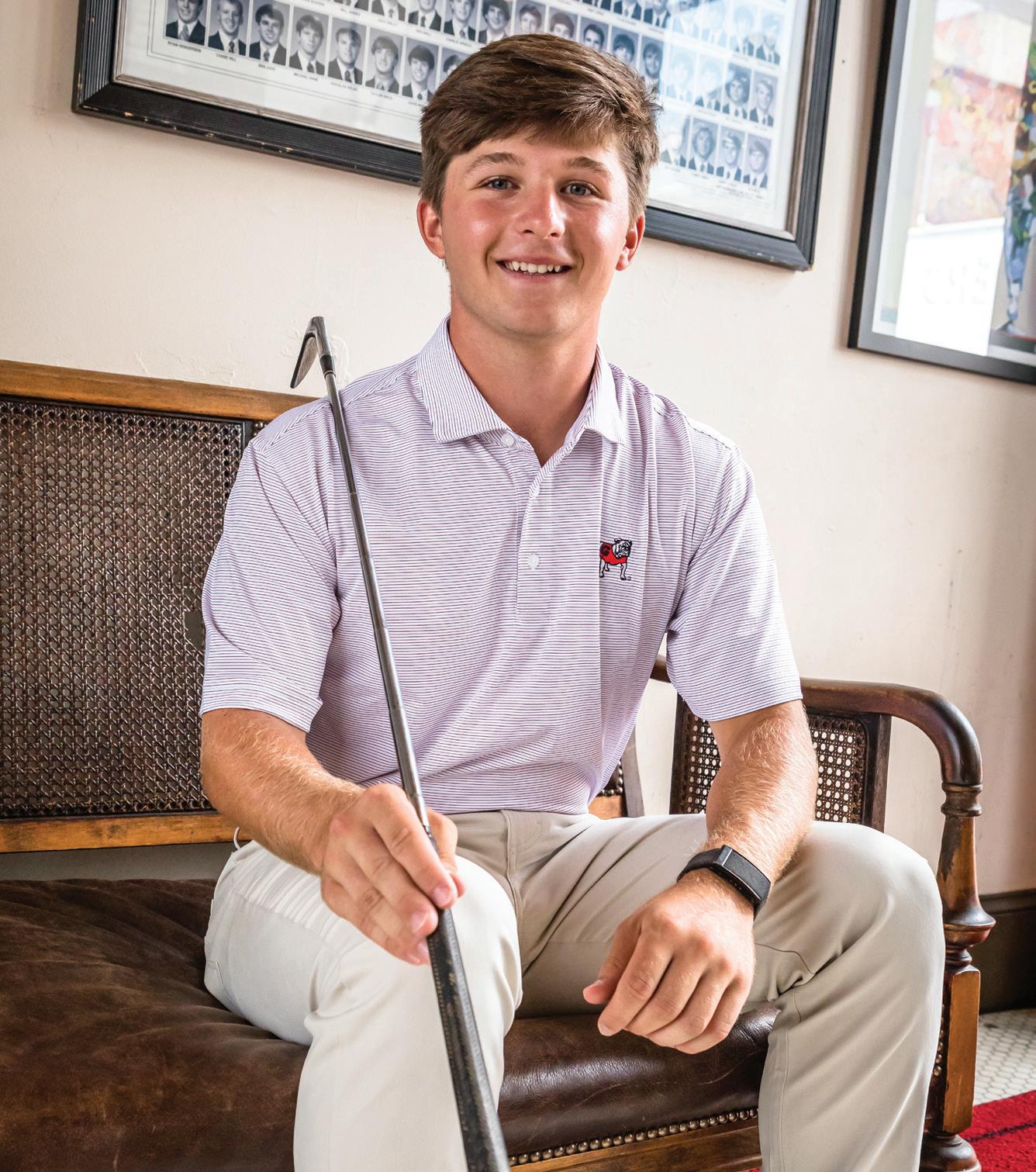


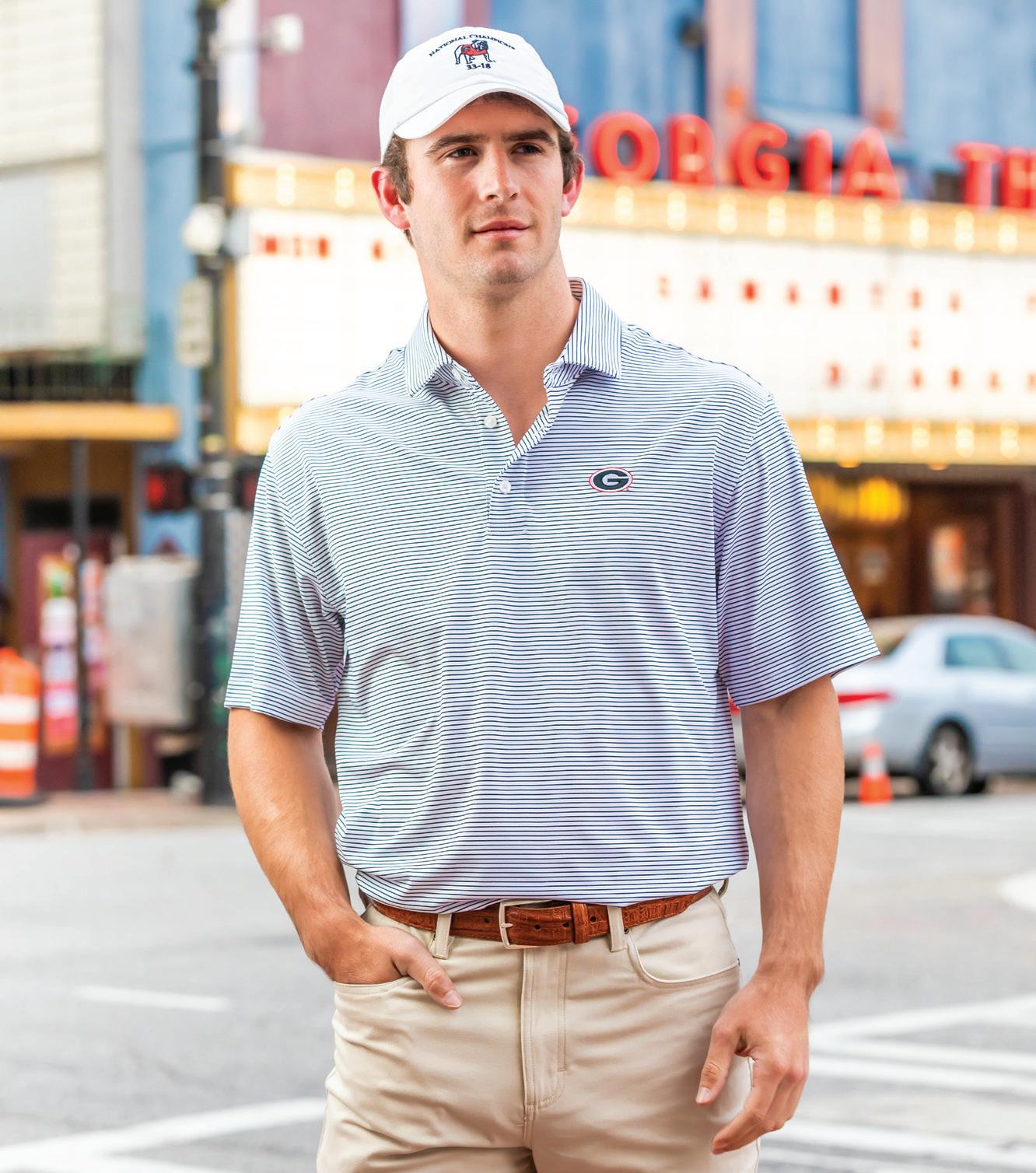

Thank
and Go Dawgs!”
Athens.TM
Authentically
DOWNTOWN ATHENS 146 E CLAYTON STREET SHOP ONWARDRESERVE.COM OR ONE OF OUR 11 OTHER STORES... & GROWING!
you
T.J. Callaway (BBA ‘07) UGA Alumni Association Board Member Magill Society Member
BUCK BRUMLOW UGA Golf Team
STETSON BENNETT Quarterback on the 2021 National Championship team
An Oxford Education
The President’s Pen
President Jere W. Morehead discusses educational partnerships for the future.
UGA
to
Z Highlights from across the UGA community.

On the Bulldog Beat UGA’s newest residence hall celebrates the legacy of the university’s first Black freshmen.
Bulldog Bulletin
News for UGA alumni.
Class Notes
Play center for the Lakers (almost), run in the Belmont Stakes (as an owner), and cover the Cincinnati Reds (from the press box) with UGA alumni.
Faculty Focus
Get to know Martin Kagel, A.G. Steer Professor in Goethe Studies, Franklin College of Arts & Sciences.
28 An Oxford Education
Surrounded by stunning architecture and rich history, UGA students take up the challenge of studying at the University of Oxford with its prestigious faculty.

These bags of leftover oyster shells, collected from restaurants, will be turned into natural reefs to provide protection for the increasing number of young oysters making their home in the marsh areas near Skidaway Island, Georgia, p. 24.
The birthplace of public higher education in America meets the world’s oldest English-speaking university peter frey
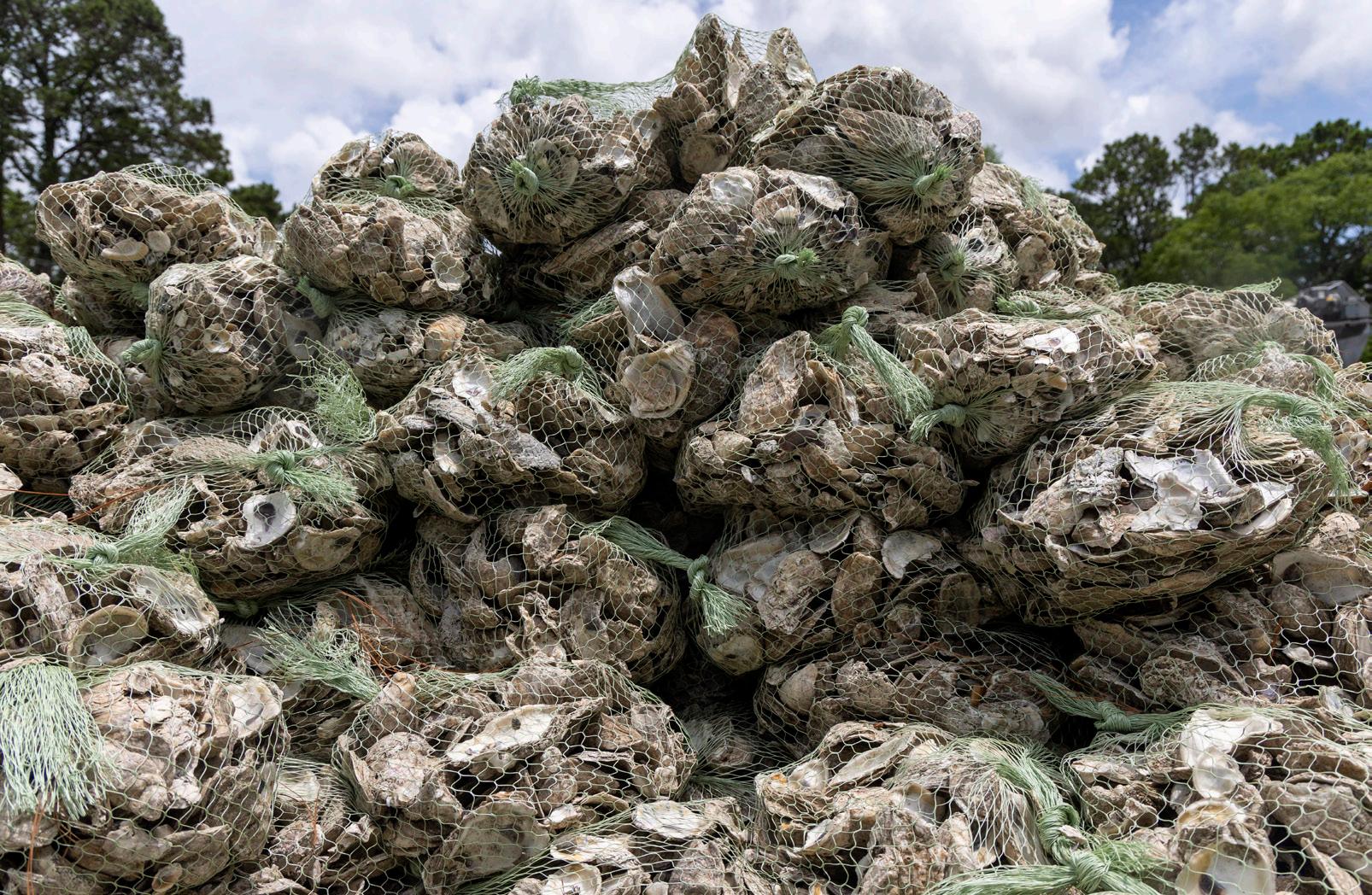
georgia magazine | fall 2022 1
INSIDE 5 7 36 38 40 56
the magazine of the university of georgia fall 2022
cover photo by dorothy kozlowski
UGA photographer Dorothy Kozlowski captured Brenna Daly, Anna Purcell, and Hannah Nicholson walking through the Keble College campus in Oxford in June 2022.

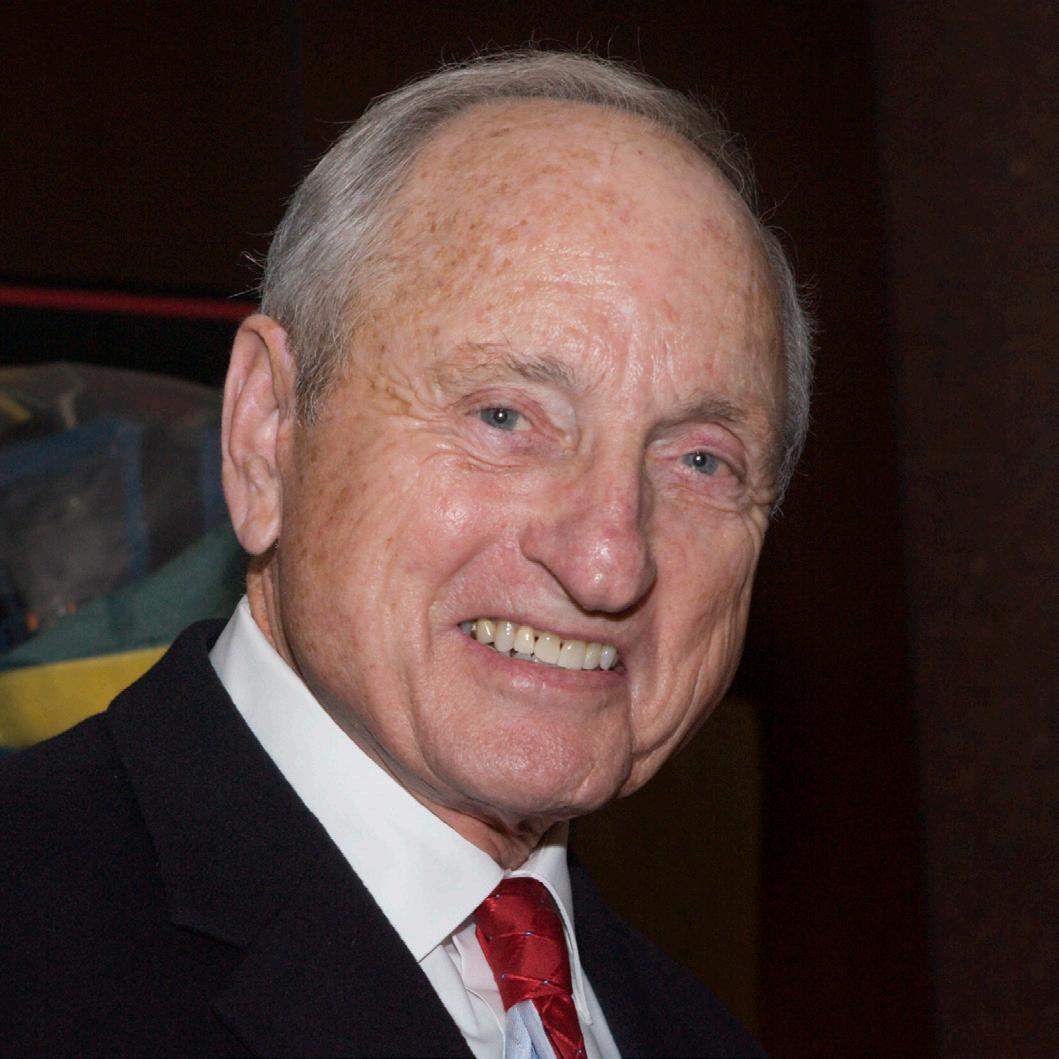
2 georgia magazine | fall 2022
Remembering a Legend
vince dooley, georgia’s winningest football coach, athletics director for a quarter century, and coach of the 1980 national championship team, died on October 28 at the age of 90. For more than 50 years, Dooley defined Georgia athletics. He served as head football coach at UGA from 1963 to 1989 and as director of athletics from 1979 to 2004. Dooley was a man of great foresight in times of charting the future, a man of stability in times of change, and a man of vision in critical times that have helped shape the path of college athletics.
In 2017, a statue of Dooley being carried off the field following the 1981 Sugar Bowl was erected outside of Butts-Mehre Heritage Hall. In 2019, the field at Sanford Stadium was named in his honor.
When news of Dooley’s death reached the UGA community, many Bulldogs visited the statue to pay their respects.

georgia magazine | fall 2022 3
peter frey
VOLUME 101 ISSUE NO. 4
georgia magazine
Editor · Eric Rangus MA ’94
Associate Editor · Aaron Hale MA ’16
Writers · Leigh Beeson MA ’17 and Jayne Roberts
Art Director · Jackie Baxter Roberts
Advertising Director · Kipp Mullis ABJ ’93
Photo Editor · Peter Frey BFA ’94, UGA Photographers · Andrew Davis Tucker, Dorothy Kozlowski BLA ’06, ABJ ’10, and Chamberlain Smith ABJ ’18
Contributing Writers · Elizabeth Elmore BBA ’08, ABJ ’08, James Hataway MA ’10, Clarke Schwabe ABJ ’08, Alexandra Shimalla MA’19, and Danielle Bezila
Contributing Designers · Amanda Qubty BFA ’12, and Amy Gunby BFA ’20
Editorial Interns · Ireland Hayes, Rachel Cooper, and Kendal Cano BSFCS ’22
marketing & communications
Vice President · Kathy Pharr ABJ ’87, MPA ’05, EdD ’11
Associate Vice President Greg Trevor Senior Director for Integrated Media Communications Rod Guajardo Senior Executive Director for Operations & Fiscal Affairs · Fran Burke
administration
President · Jere W. Morehead JD ’80
Senior VP for Academic Affairs & Provost · S. Jack Hu
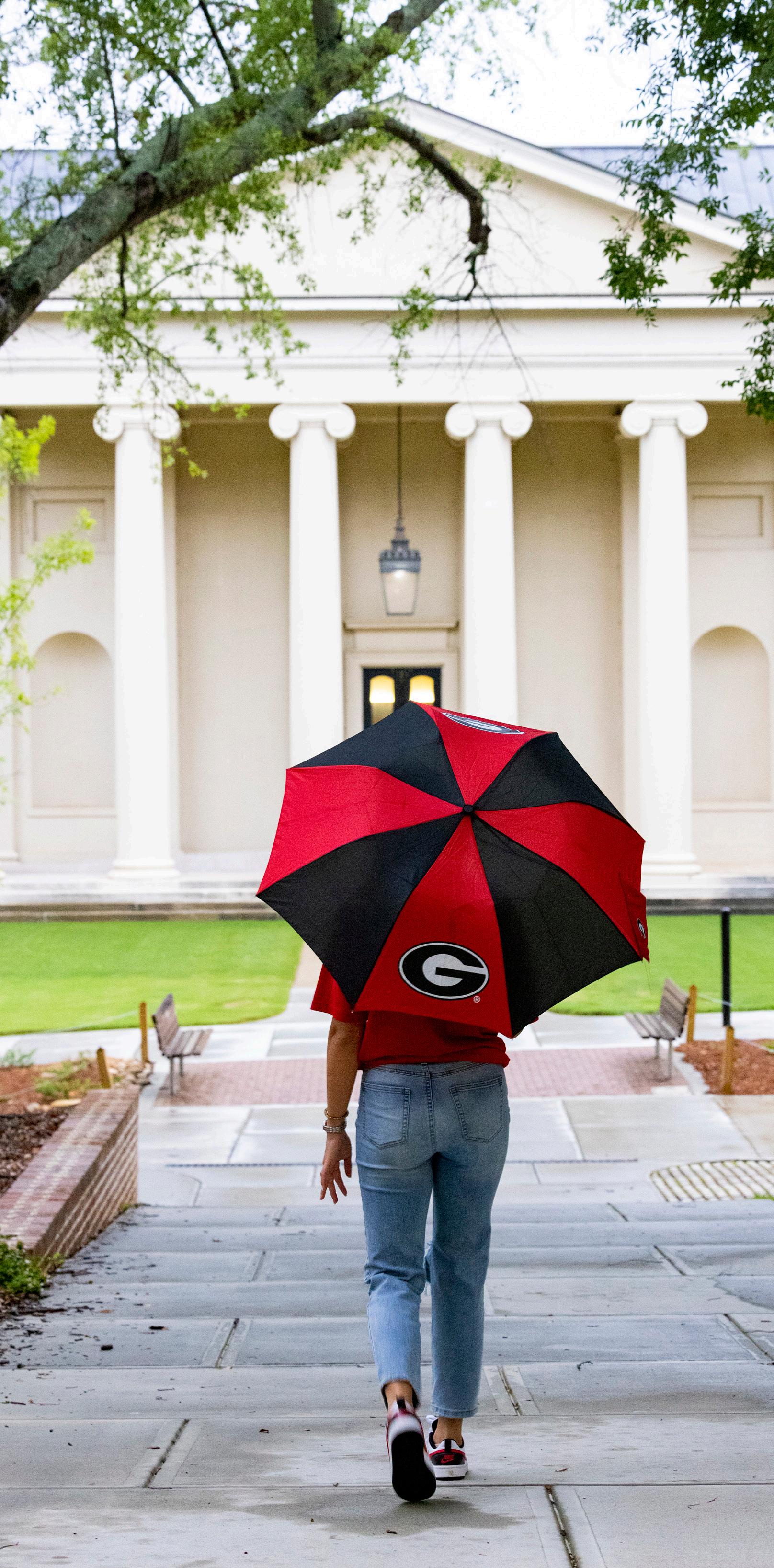
VP for Finance & Administration · Ryan Nesbit MBA ’91
VP for Development & Alumni Relations · Kelly Kerner
VP for Instruction · Marisa Anne Pagnattaro PhD ’98
VP for Research · Karen J. L. Burg
VP for Public Service & Outreach · Jennifer Frum PhD ’09
VP for Student Affairs · Victor Wilson BSW ’82, MEd ’87
Interim VP for Government Relations · J. Griffin Doyle AB ’76, JD ’79
VP for Information Technology · Timothy M. Chester
Georgia Magazine by contacting Kipp Mullis at e: gmsales@uga.edu or ph: 706-542-9877 fine print Georgia Magazine (issn 1085-1042) is published quarterly for alumni and friends of UGA. postmaster | Send address changes to: University of Georgia 286 Oconee Street, Suite 200 North Athens, GA 30602
University of Georgia does not discriminate on the basis of race, sex, religion, color, national or ethnic origin, age, disability, sexual orientation, gender identity, genetic information, or military service in its administrations of educational policies, programs, or activities; its admissions policies; scholarship and loan programs;
other
programs; or
or complaints should be directed to the
fall 2022 dorothy kozlowski
Change your mailing address by contacting e: records@uga.edu or ph: 888-268-5442 Find Georgia Magazine online at news.uga.edu/georgia-magazine Submit Class Notes or story ideas to gmeditor@uga.edu advertise in
The
athletic or
University-administered
employment. Inquiries
Equal Opportunity Office 119 Holmes-Hunter Academic Building, University of Georgia, Athens, GA 30602. Telephone 706-542-7912 (V/TDD). Fax 706-542-2822. https:// eoo.uga.edu/
“The University of Georgia is proud to partner with PreK–12 schools and nonprofit organizations on these and many other programs to provide a network of support for Georgia’s youth.”
Partnerships for the Future

University of Georgia programs are helping young people throughout the state expand their ideas of what the future may hold and create paths to achieve their goals. Extending educational opportunities to students of all ages is part of UGA’s efforts to improve lives and strengthen communities as a land-grant institution.
Among the University’s many statewide programs benefiting PreK–12 students, Georgia 4-H serves the largest number, reaching more than 242,000 in grades 4 through 12 each year. Administered by UGA Extension, Georgia 4-H helps young people build leadership and communication skills, develop healthy lifestyles and financial literacy, contribute to civic life, become good stewards of our natural resources, and advance agriculture and the STEM disciplines.
Another statewide program, the Georgia College Advising Corps, works to increase the number of underrepresented, first-generation, and low-income students who earn college degrees. This partnership between UGA’s Louise McBee Institute of Higher Education and the College Advising Corps helps 4,000 high school students each year with all aspects of the college admissions process, from researching college options to submitting applications and applying for financial aid.
Within the local Athens community, Horizons at UGA blends literacy and STEAM (science, technology, engineering, arts, and mathematics) with swimming to build selfconfidence and a lifelong interest in learning for rising first graders. Launched in summer 2022, Horizons UGA is a partnership among the Mary Frances Early College of Education, the Clarke County School District, and Horizons Atlanta.
UGA also partnered locally with the Clarke County School District to create InnovateU, a program that empowers high school students to solve real-world business challenges by developing leadership, teamwork, design thinking, and other valuable skills. Local business professionals and UGA faculty, staff, and students assist with the program, which takes place in the Delta Innovation Hub, part of UGA’s growing Innovation District.
The University of Georgia is proud to partner with PreK–12 schools and nonprofit organizations on these and many other programs to provide a network of support for Georgia’s youth. Together, we are helping to build a brighter future for students and a brighter future for our state.
Jere W. Morehead President

georgia magazine | fall 2022 5
THE PRESIDENT’S PEN
UGA programs benefit PreK–12 students across Georgia
Our future is rooted in improving agriculture and protecting the environment. At the College of Agricultural and Environmental Sciences, we are leading the way in instruction, outreach and innovation to care for our global ecosystems, enrich our communities and equip the next generation of leaders. Learn how we are dedicated to discovering, teaching and sharing the science of everyday living at caes.uga.edu.

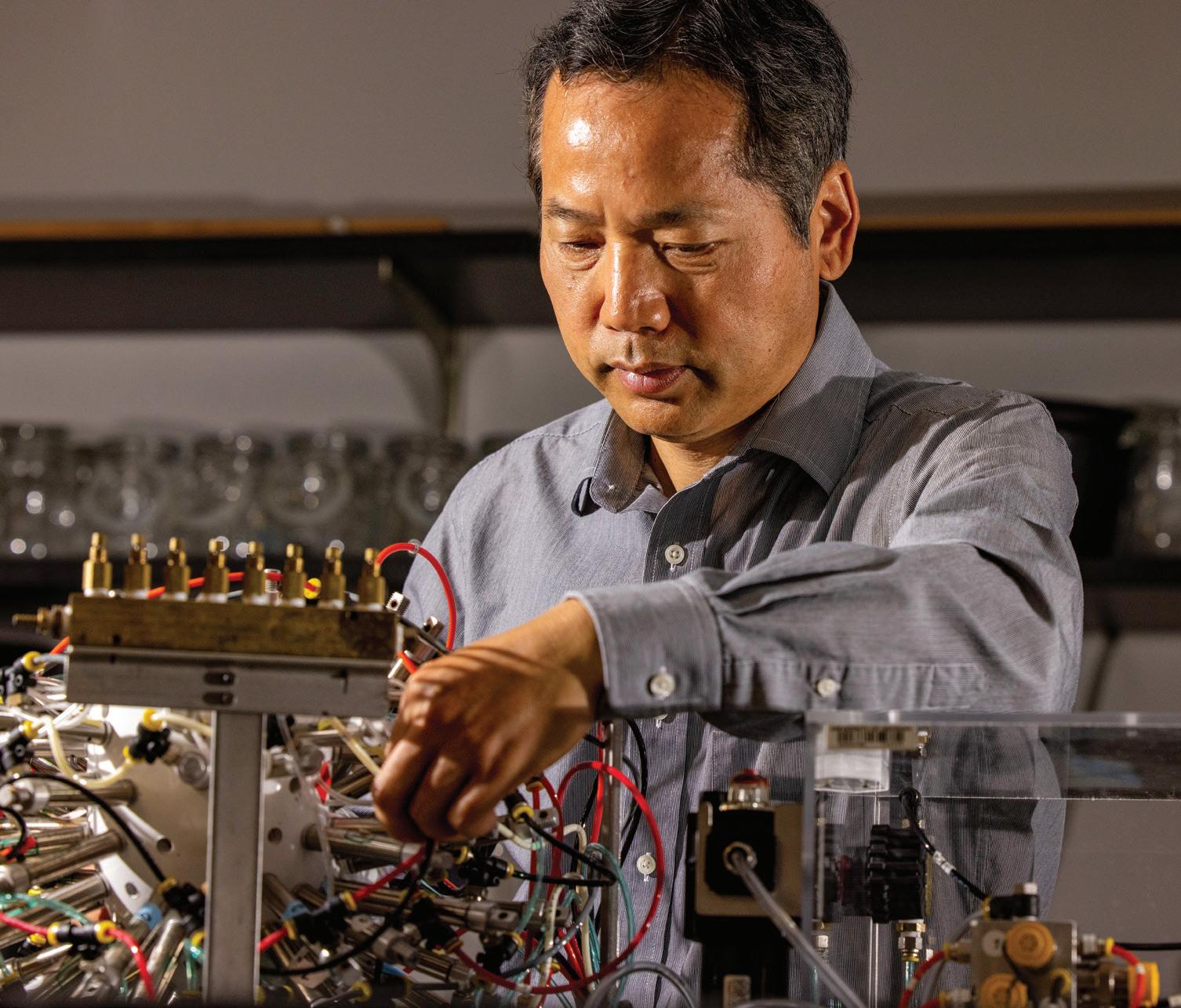

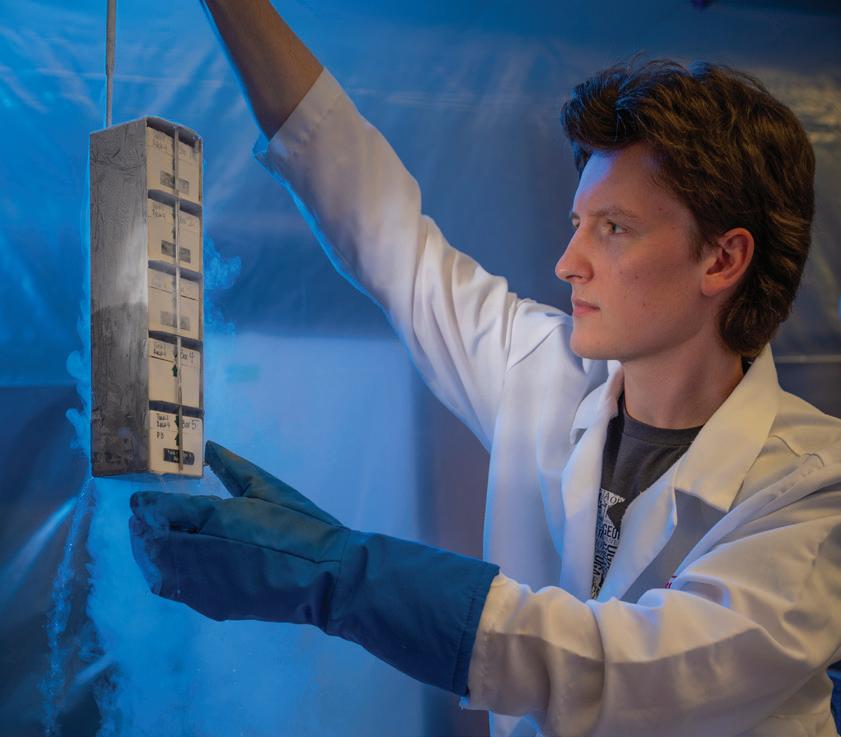

Subscribe to CAES updates to have the latest agricultural and environmental science news delivered to your inbox. Scan the code at left to subscribe or visit newswire.caes.uga.edu.

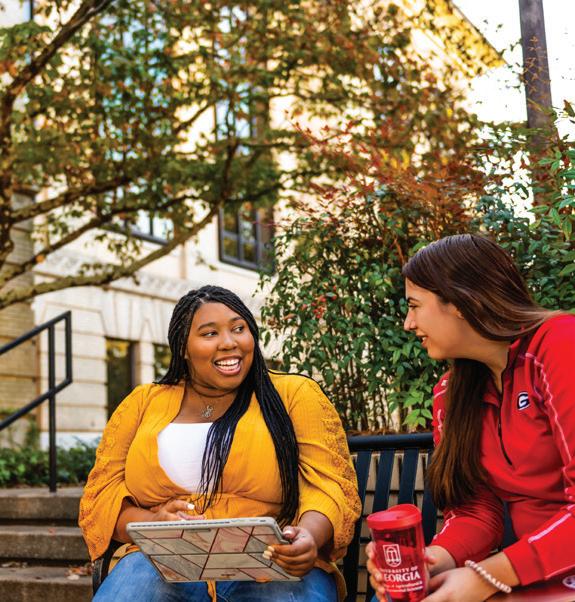
UGA Z
UGA Athletic Headquarters Grows
The latest expansion of the University of Georgia’s Butts-Mehre Heritage Hall—the administrative center for the Athletic Association and the operational hub for the football program—was dedicated in May.
The $80 million, donor-funded expansion added 165,000 square feet, which included a much larger weight room, sports medicine facility, locker room, and player lounge. A final phase of construction will renovate and repurpose existing spaces to accommodate the sports medicine and track and field programs. When complete, the facility will benefit all 21 sports programs at UGA.

to
georgia magazine | fall 2022 7
Highlights from across the UGA community
dorothy kozlowski
COMMIT TO THE G
STRENGTH IN COLLABORATION
UGA Recognized in National Rankings
The University of Georgia held fast at No. 16 in U.S. News & World Report’s 2023 ranking of the best public universities in the nation, marking the seventh consecutive year as a top 20 school.
UGA continues its commitment to academic excellence by enhancing its long-standing position as a national leader in public higher education. Over the past year, the university has implemented new initiatives in STEM, faculty growth, and experiential learning, further investing in student success.
16
# BEST PUBLIC UNIVERSITY 2023
UGA Partnering with Emory to Build on Cancer Research
The University of Georgia and Winship Cancer Institute of Emory University share a longstanding commitment to accelerating cancer prevention, diagnosis, and treatment, and educating the next generation of cancer researchers. In July, with that commitment in mind, the two institutions partnered to hold the first in-person UGA-Winship Summit: Advancing Cancer Research in Georgia at Stone Mountain Park just outside Atlanta.
U.S. News & World Report
Along with the new ranking from U.S. News & World Report, Niche recently named UGA the No. 10 U.S. public university and the No. 2 college with the best student life in America. Forbes ranked UGA No. 21 on its list of top public colleges nationwide. The Princeton Review gave UGA top scores across the board on its lists of high-achieving public universities, including the No.10 best school for alumni networks and No. 15 best school for internships.
The two-day, collaborative retreat focused on exploring the strengths and synergies of the two institutions, sharing knowledge, and partnering for impact in the state of Georgia and beyond. Summit events included a keynote presentation from Tony Hunter, deputy director of the Salk Institute Cancer Center; a poster session featuring the research of students and trainees; and faculty presentations on emerging topics that spanned basic, translational, clinical, and population sciences.
SPECIAL GUEST
FLOTUS Visits UGA, Meets Local Schoolchildren

On July 21, First Lady of the United States Jill Biden and U.S. Secretary of Education Miguel Cardona met with local schoolchildren, parents, and educators at the University of Georgia’s Ramsey Student Center to learn more about a summer enrichment program offered by Horizons Atlanta.
The six-week learning experience, supported by the Mary Frances Early College of Education, combines academics with confidence-building activities like swimming, arts, and athletics to help build a lifelong passion for learning.
Launched in early 2022, Horizons Atlanta at UGA will serve 270 rising first- through ninth-graders from the Athens area at full enrollment.
8 georgia magazine | fall 2022 CONTINUED EXCELLENCE
graphic by lindsay bland robinson UGA to Z to Z
First Lady of the United States Jill Biden visited the Horizons summer learning program at UGA. Horizons combines academics with confidence-building activities like arts and athletics to help build a lifelong passion for learning.
chamberlain smith
Map Helps UGA Expand Georgia Broadband Service
Nearly a year after unveiling a map showing far more Georgians were without broadband access than previously thought, the University of Georgia has helped the state distribute more than $400 million in grants to bring faster, more reliable internet service to communities throughout the state.
The broadband projects, funded by the federal American Rescue Plan Act (ARPA), will impact nearly 184,000 locations in 70 counties. Approximately 132,000 Georgia communities are currently unserved by high-speed internet.
UGA’s Carl Vinson Institute of Government estimates that by the end of 2022, 4.9 million Georgia locations will have access to high-speed internet, with about 455,000 still unserved. By 2026, when the ARPA and other federal grant projects conclude, only 205,000 locations will remain unserved.
“Reckonings and Reconstructions: Southern Photography from the Do Good Fund”

DOING GOOD
GMOA Photo Exhibition Pictures the South
The exhibition, “Reckonings and Reconstructions: Southern Photography from the Do Good Fund”, on view at the Georgia Museum of Art from Oct. 8 through Jan. 8, 2023, draws from a remarkable and sweeping collection of photography made in the South from the 1950s to the present.
Founded 10 years ago by Alan Rothschild JD ’85, the Do Good Fund has built a museumquality photography collection telling the story of the ever-changing American South. The exhibition also includes work by several UGA alumni, including Rosie Brock MFA ’22 , Joshua Dudley Greer MFA ’09 , Brittainy Lauback MFA ’14, Kristine Potter AB ’01, BFA ’01, Georgia Rhodes MFA ’15, and Rylan Steele MFA ’07, as well as R.E.M. frontman and longtime Athenian Michael Stipe M ’82
The exhibition will be accompanied by the first comprehensive catalog of the Do Good Fund’s photographic holdings, co-published by the museum and the University of Georgia Press. Following its stay at the GMOA, Reckonings and Reconstructions will travel to museums in St. Louis, Miami, and Davenport, Iowa.
IS MORE
Some Types
of Stress
Could Be Good for Your Brain
It may feel like an anvil hanging over your head, but that looming deadline stressing you out at work may actually be beneficial for your brain, according to research from the Youth Development Institute at the University of Georgia.

The study found that low to moderate levels of stress can help individuals develop resilience, reduce their risk of developing mental health disorders, and help them cope with future stressful encounters.
“If you’re in an environment where you have some level of stress, you may develop coping mechanisms that will allow you to become a more efficient and effective worker and organize yourself in a way that will help you perform,” says Assaf Oshri, lead author of the study and an associate professor in the College of Family and Consumer Sciences.
The stress that comes from studying for an exam or preparing for a big meeting at work can potentially lead to personal growth, but the line between the right amount of stress and too much stress is a thin one. And the ability to tolerate stress and adversity varies greatly according to the individual.
Things like age, genetic predispositions, and community all play a part in how well individuals handle challenges. While a little stress can be good for cognition, continued levels of high stress can be incredibly damaging, both physically and mentally.
This map, created by UGA’s Carl Vinson Institute of Government, shows the extent of broadband access in the state in 2021. The surprising visual helped spur efforts to provide broadband access to millions more Georgians by the end of 2022.

LOGGING ON
getty images
STRESS
Georgia Museum of Art Oct. 8, 2022, through Jan. 8, 2023
georgia magazine | fall 2022 9 UGA to Z
susan worsham
special





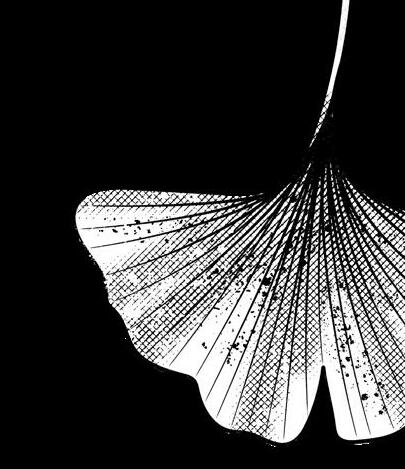









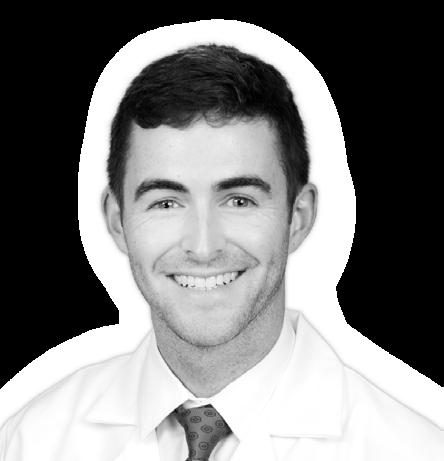
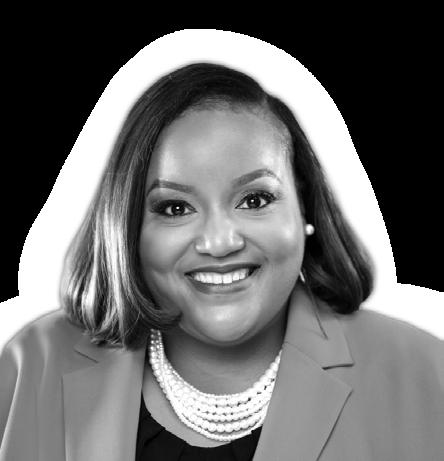
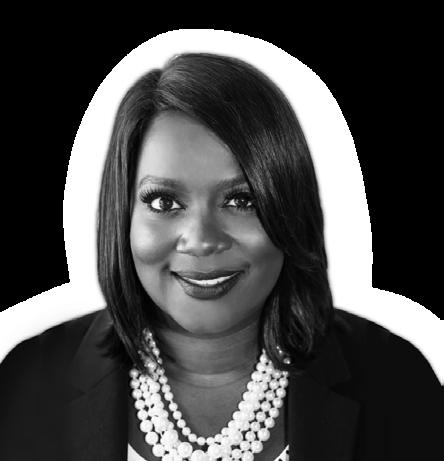

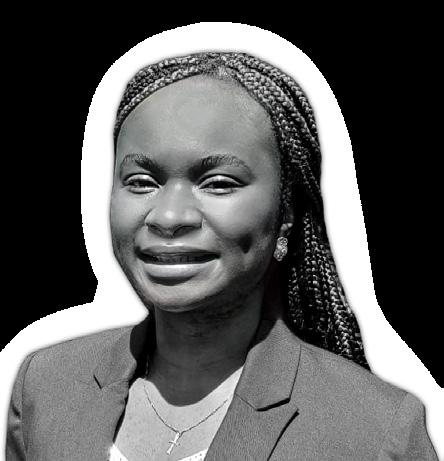
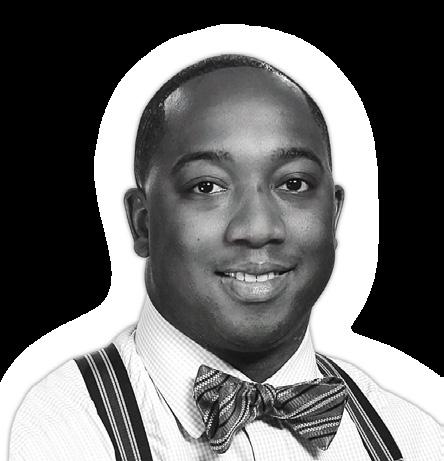




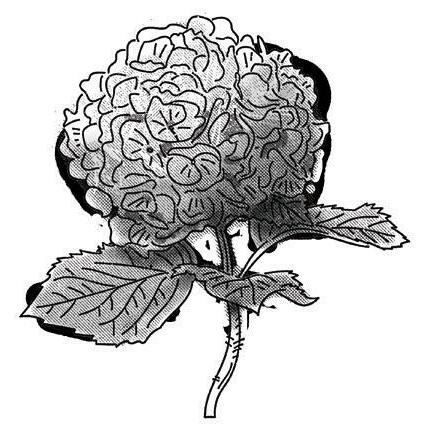







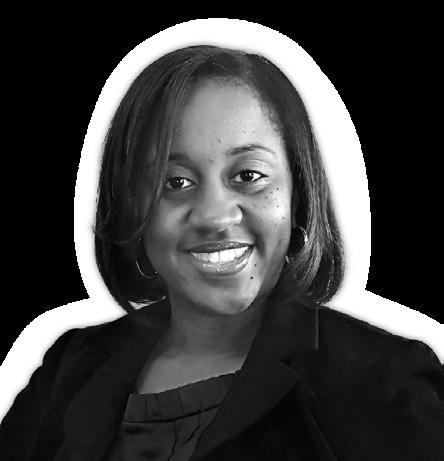
CONGRATULATIONS TO THE 40 UNDER 40 CLASS OF 2022! ALUMNI.UGA.EDU/40U40
Nathan Bruno
Christina L. Faust
Lauren Culbertson Grieco
Maranie Brown
Dustin Dyer
Jake Goodman
Latasha V. Barnes
Candace Alynn Hill Duvernay
Kevin Florence
AdeSubomi O. Adeyemo
Lael Chappell
Matthew Scott Fowler
Maria Augutis
LEADING THE PACK IN THEIR INDUSTRIES AND COMMUNITIES
Emily Curl
Kayla E. Cooper
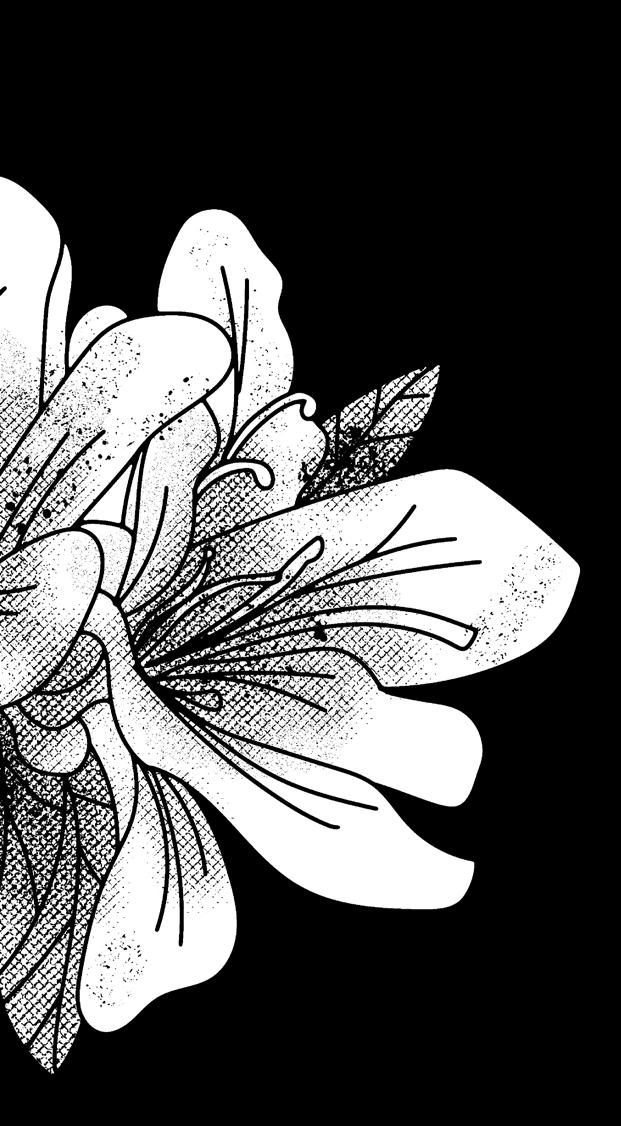








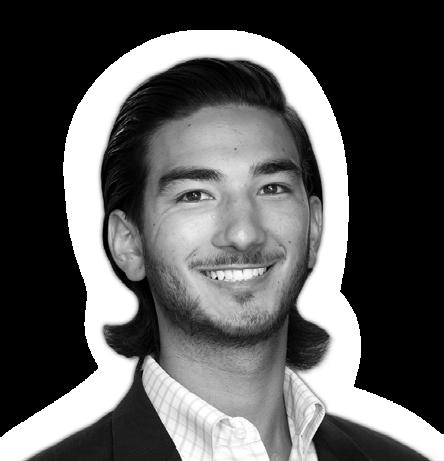


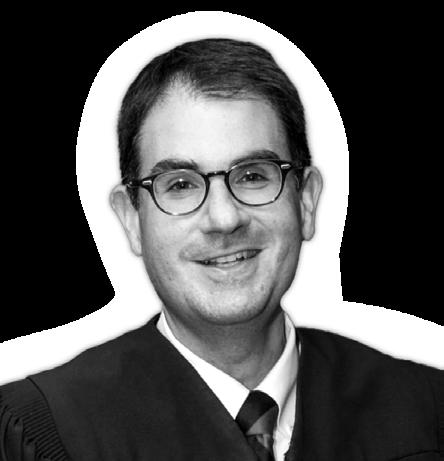




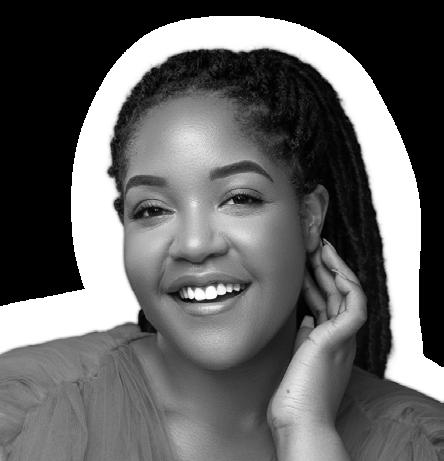
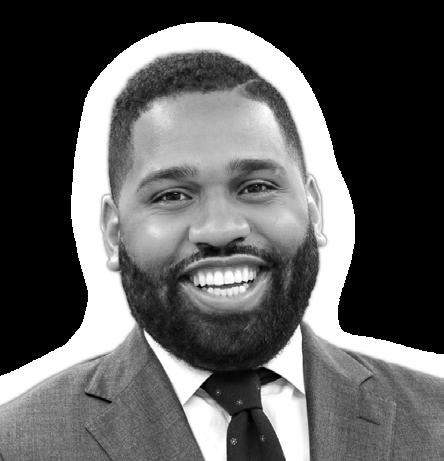




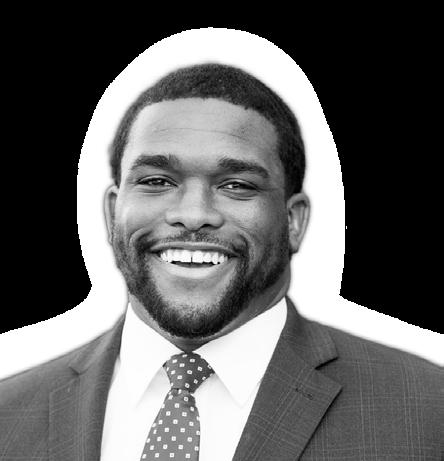


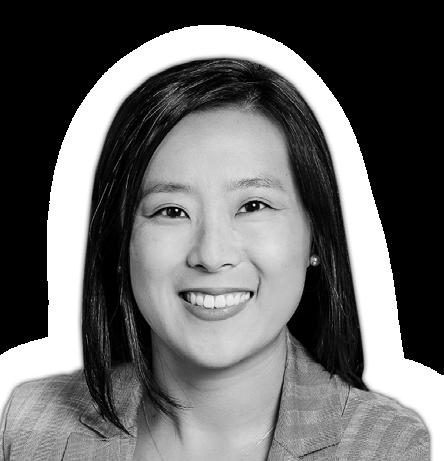


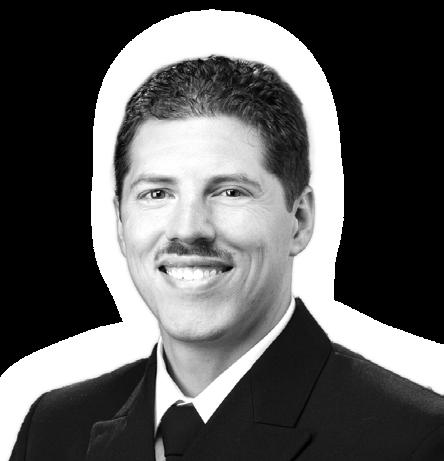



 Leo Chris Kasuya
Kenneth L. Johnson, Jr.
Michael Waldron
Brendan F. Murphy
Rachel Santos
Mia Catharine Mattioli
Kevin Schatell
Joel L. McKie
ValaRae Partee
Samaad Wes Keys
Alton M. Standifer
Juan J. Mencias
Anna Daniel Reddish
Charlotte Lucas
Johnelle Simpson II
Drew McKown
Andrew Rasmussen
Min Y. Lee
Grant Thomas
Chad Mumm
John Rossow
Brandon Martin
Christie Johnson
Kristen Henderson
Shayla Hill
Leo Chris Kasuya
Kenneth L. Johnson, Jr.
Michael Waldron
Brendan F. Murphy
Rachel Santos
Mia Catharine Mattioli
Kevin Schatell
Joel L. McKie
ValaRae Partee
Samaad Wes Keys
Alton M. Standifer
Juan J. Mencias
Anna Daniel Reddish
Charlotte Lucas
Johnelle Simpson II
Drew McKown
Andrew Rasmussen
Min Y. Lee
Grant Thomas
Chad Mumm
John Rossow
Brandon Martin
Christie Johnson
Kristen Henderson
Shayla Hill
Building a ‘global epicenter’
Georgia produced 7.9 billion pounds of chicken and 5 billion eggs in 2021, according to the U.S. Department of Agriculture— ranking second and sixth, respectively, in the nation—creating an economic impact on the state measured in the tens of billions of dollars.
It is little wonder, then, why the University of Georgia has secured millions in public and private funding to build a facility intended to make Athens the center of the poultry science universe.


“At a time when many institutions are consolidating departments or reducing funding to poultry science, elevating poultry science at UGA has so many benefits,” says Todd Applegate, head of the UGA College of Agricultural and Environmental Sciences (CAES) Department of Poultry Science and R. Harold and Patsy Harrison Chair in Poultry Science (pictured at right).

“This project effectively leverages a statewide strength, establishes Athens as the global epicenter of poultry science, advances an important part of agricultural science and fortifies Georgia’s economy,
solidifying the foundation of poultry and its supporting agribusiness sectors.”
The new building will be located on D.W. Brooks Drive across from the existing Poultry Science building on what was previously a parking lot between Boyd and Conner Halls (see map below). The addition will increase the size of the department’s existing facilities to more than 70,000 square feet; modernize instructional and lab space; provide centralized, studentfocused facilities; and help to attract and retain world-class researchers. Construction began in spring 2022, and completion is set for fall 2023.
The project has an estimated cost of $54.1 million. The Georgia General Assembly provided a total of $27.1 million in state funds, and private donors have contributed over $10 million to date for the project, including several seven-figure gifts (see opposite page).
“Poultry has long been deeply tied to this state and this university, so for many, supporting this campaign is not just a reasoned investment but a show of pride and trust,” says Alec Poitevint AB ’02, the son of a UGA poultry science alumnus and the
first donor to the Poultry Science Building campaign. “I have always taken pride in seeing UGA lead in this area, and I take pride in now helping the university solidify its position as a global leader in the field.”
The poultry science department already has a number of priorities once the building is complete: more endowed faculty positions, an enhanced focus on industry and workforce development, and closer collaboration with CAES’ food science and technology department. UGA poultry science is ready for a future where its faculty are the global authority on poultry, and their students and alumni are too.
“Our industry has improved because of research, teaching, and Extension work done by UGA poultry scientists,” says Kylie Bruce BSA ’21, who plans to continue her family’s poultry business where her greatgrandfather built their first poultry house. “As the fourth generation to live on my family’s farm, I hope this new facility will bring developments that further strengthen Georgia’s poultry industry so that my greatgrandchildren will also get to be a part of feeding the world one day.”
BULLDOGS GIVE BACK 12 georgia magazine | summer 2022
POULTRYBUILDING.CAES.UGA.EDU View a live feed of the construction of the Poultry Science Building and learn more about the project at poultrybuilding.caes.uga.edu
12 georgia magazine | fall 2022 DW Brooks Mall
Private support is helping UGA become the poultry science capital of the world
Jackson Street Cemetery
Performing Arts NORTH OC O N E E R I V E R Building 2130 RIVERRD Poultry Science Food Science Sanford Stadium Tate Student Center FIELD ST SANFORD DR ysics Geography /Geology Chemistry CCQC Biological Sciences Dawson Soule Science Library Dance s arine cience Miller Plan t Sciences Aderhold Ecology Forestry Resources Environmental Health Sciences Hardman Computing Services EASTGREEN ST US Forest Service DR Tucker SOULE ST ST GREEN ST DW BROOK S D R Conner Lumpkin House Barrow eology Lab l B Miller earning Center Bookstore Reed Milledge Payne Memorial Hall Instructional Plaza Journalism Psychology Military /ROTC ine Arts Baldwin Main Library Law School Jackson Stree t Building Peabody Old College New College King Law Library bert ler Moore Brooks Park e wn LeConte Sanford Dean Rusk ders orial den Denmark Caldwell S HERTYDR JACKSON ST THOMAS ST BALDWIN ST HOOPER ST E AST CAMPUS R D N HERTY DR BROAD ST Holmes/Hunter Academic Bldg Demosthenian Chapel Phi Kappa Terrell Administration Bishop Waddel Lustrat Human Resources Business Services Thomas Street Art Complex Tanner Training & Development Center Chicopee Comp lex E BROADST North Campus Deck Speirs Alpha Epsilon Pi Kappa Sigma FULTON ST SOUTH ST MITCHELLST SPRINGST OCKST Central Steam Plant Herty Field houses Pharmacy South Hodgson Oil Building ReedPlaza n t o w n A t h e n s School of Social Work Building PAC Deck Wilson Pharmacy W I LLIAMSST Trial Gardens Sigma Nu Tau Epsilon Phi Pi Kappa Alpha Phi Delta Theta GREEKPA R K RIC Ceramics nce ning nter eorgia Quad Dooley Field Boyd Rsrch and Edu Ctr Davison Life Sciences Complex Innovation Hub SBDC STEM Research Building M A I N C A M P U S M A P Summer 20 21 L E G E N D ACC Buildings Railroad UGA Buildings Sidewalks Recreation Areas Water Features UGA Property Parking Areas Landbase Grounds
Oconee Hill Cemetery
BULLDOGS PAVING THE WAY
UGA is uniquely positioned to become the global epicenter of poultry science thanks to the strength and prominence of Georgia’s poultry industry.

• Broilers—chicken raised for meat production—account for 24% of Georgia’s agricultural commodities. The next highest is cotton, accounting for just 6%.*
• According to USDA statistics, if Georgia were a country, it would rank eighth in the world in chicken meat production.
• Poultry and eggs contribute $21.5 billion and over 82,000 jobs to Georgia’s economy.*
• Three out of four Georgia counties are involved in poultry and egg production.*
*UGA Center for Agribusiness and Economic Development

Seven-figure supporters of the Poultry Science Building campaign:*
• A $3 million gift from the Luther and Susie Harrison Foundation to name the main lobby of the Poultry Science Building. This latest grant furthers prior commitments made by the foundation in appreciation of the CAES Department of Poultry Science having previously established the R. Harold Harrison Distinguished Professorship in 2017. The foundation was created in 1994 by R. Harold Harrison, founder of Harrison Poultry, in honor of his parents and to support education, faith, and health initiatives in Georgia.
• A $1.1 million gift from Georgia-based Wayne Farms, a subsidiary of Continental Grain Company, the seventh-largest vertically integrated poultry producer in the U.S.
• A $1 million gift from the R. Harold and Patsy Harrison Foundation, the first seven-figure commitment to the building campaign. This gift was part of a $3.6 million total commitment, which also established a distinguished professorship/chair for the head of the poultry science department.
*as of June 30, 2022
• Abit Massey BBA ’49
• AgGeorgia Farm Credit
• Aviagen
• CBH International
• Claxton Chicken
• Columbia Farms of Georgia/House of Raeford
• Crider Foods
• Crystal Farms
• Farm Credit Associations of Georgia
• The Franklin P. and Arthur W. Perdue Foundation
• Georgia Poultry Federation
• Harrison Poultry
• In Honor of Henry Massey
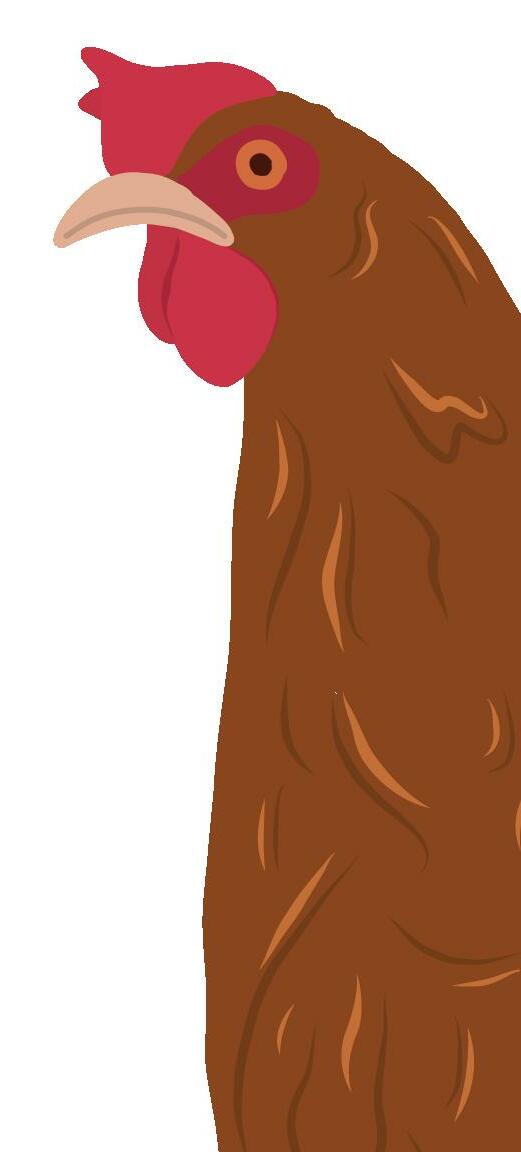
• Juliette and Henry Massey
• Koch Foods
• Merck Animal Health
• Mountaire Farms
• Raising Cane’s
• Southeastern Minerals
• UGA CAES Alumni Association
georgia magazine | fall 2022 13
Individuals and organizations representing a multitude of interests around the poultry industry are supporting the UGA Poultry Science Building campaign. They include:
andrewdavis tucker
14 georgia magazine | summer 2022
written by james hataway ma ’10
Ateam of researchers led by scientists at the University of Georgia and the Cincinnati Children’s Hospital Medical Center are near the completion of a phase 1 clinical trial for a new single-dose intranasal COVID vaccine.
Unlike traditional vaccines that require an injection, this vaccine is administered through a nasal spray similar to those commonly used to vaccinate against influenza. A fine mist inhaled through the nostrils allows the vaccine to target the mucosal cells that line the nasal passages and airways.
Phase 1 clinical trials were conducted at four sites in Kentucky, New York, Ohio, and Texas. The trials are based on encouraging preclinical results reported in the peerreviewed journal Science Advances
“We have been developing this vaccine platform for more than 20 years, and we began working on new vaccine formulations to combat COVID-19 during the early days of the pandemic,” says Biao He, a professor in UGA’s Department of Infectious Diseases in the College of Veterinary Medicine. “Our preclinical data show that this vaccine not only protects against infection but also significantly reduces the chances of transmission.”
THE ADVANTAGES OF NASAL SPRAY VACCINES
He and his collaborators developed the vaccine by inserting a portion of the SARS-CoV-2 spike protein into another virus known as parainfluenza virus 5, or PIV5, which is thought to contribute to upper respiratory infections in dogs but is completely harmless to humans.
The modified PIV5 virus acts as a delivery vehicle that produces proteins found in the coronavirus and prompts the immune system to mount a defense—ultimately promoting immunity to infection.
Most people contract COVID-19 through droplets from infected individuals when they cough or sneeze. Those droplets go into a person’s upper airways, and that’s where the virus begins replicating so it can spread throughout the lungs and other parts of the body.
“This vaccine targets those areas specifically and creates lasting immunity at the site of infection,” says Mark Tompkins, professor of infectious diseases at UGA and a member of the research team.
Dan Wagner, a clinical trial volunteer from Cincinnati, told USA Today that he had experienced no side effects and that he’s hopeful about the vaccine.
“I wanted a vaccine that protects other people too, not just myself,” Wagner said.
PROMISING RESULTS
Previous studies showed that the vaccine produced a localized immune response, involving antibodies and cellular immunity, that completely protected mice from fatal doses of SARS-CoV-2. The vaccine also prevented infection in ferrets and, importantly, appeared to block transmission of COVID-19 between animals.
The vaccine used in the trial only requires a single dose, and it can be stored at normal refrigerator temperatures for up to three months, He said. Because it is given
a
A team co-led by UGA professor Biao He has been developing vaccines for more than 20 years. Researchers recently applied their technology to a nasal spray vaccine for COVID-19.

intranasally, the vaccine is also easier to administer, especially for those with a fear of needles.
Previous studies showed the vaccine platform completely protects experimental animals from another dangerous coronavirus, Middle Eastern Respiratory Syndrome. The disease, also known as MERS, was first reported in Saudi Arabia in 2012.
“We are all very fortunate to have a team of dedicated scientists who made the development of this vaccine possible,” He says. “We are eager to see the results from the phase 1 clinical trial, and we want to move this technology forward as fast as possible so that we can help control the COVID-19 pandemic.”
This research was supported by CyanVac, a startup company developing vaccines based on the PIV5 technology. The company is supported by Georgia Research Alliance and is based in the University of Georgia’s business incubator.
georgia magazine | fall 2022 15
Someday soon, thanks to UGA research, your next COVID-19 booster might just be a sniff away.
GM
Diplomatic Corps
written by eric rangus ma ’94
There are only a handful of titles a person can hold forever. “Ambassador” is one of them. It is a rare person who is entrusted to serve as a nation’s representative to another’s government. Diplomacy requires the highest level of skill, nuance, approachability, flexibility, and firmness. But there is no single template to succeed as a diplomat. As the experiences of these five alumni show, no diplomatic post is the same, and there are multiple paths to travel.

16 georgia magazine | fall 2022
David Adelman ABJ ’86 Ambassador to Singapore 2010-2013
Served two terms in the Georgia State Senate before being named ambassador
Currently managing director and general consul at the asset management firm KraneShares Advisors
Before his ambassadorship, David Adelman was no stranger to public service. Or to developing important relationships and getting things done.
He followed up his bachelor’s degree at UGA with a master’s in public adminis tration and a law degree. Since his time as a student in Athens he has balanced his business and family life with a variety of leadership positions with non-profit organizations and government service.
In 2002, he was elected to the Georgia State Senate becoming minority whip and chair of the Senate Urban Affairs Committee. He was an early supporter of Barack Obama’s presidential campaign serving as chair of the 2008 effort in Georgia. President Obama nominated Adelman for the role in Singapore, and he was quickly confirmed on a unani mous vote.
“Serving as U.S. ambassador in Sin gapore was a great privilege,” he says. “The growth and dynamism in Asia had become evident, and it was clear the sto ry of the 21st century would be written in the Pacific. That is why the signature foreign policy initiative of the country was our pivot to Asia.”
Personally, the experience for his young family was profound. Adelman, his wife Caroline (whom he met during their days as students at UGA) and their three children were transformed, developing a much broader world view and global network of friends.
special
In Singapore, a country with one Asia’s most important economies and most powerful militaries, Adelman went to work. He focused on three issues: security, trade, and investment. Adelman experienced success on all fronts. For example, he negotiated the first forward deployment of U.S. Navy combat ships in the country, an agreement that remains in place today. He also led U.S. trade mis sions to other nations in Asia including Indonesia, Vietnam, Malaysia, Myanmar, and India which contributed to historic highs in both U.S. exports to the region and direct investment into the U.S. from Asia.

Adelman equates his time as ambassa dor to running a leg in a relay race. “You run hard giving it your all, but you must understand it is a long race and be careful to ensure nobody drops the baton.”
After completing his ambassadorship, Adelman moved to New York City where he continued his career in finance and is on the faculty of New York University.

georgia magazine | fall 2022 17
The growth and dynamism in Asia had become evident, and it was clear the story of the 21st century would be written in the Pacific.
Randy
Evans JD ’83 Ambassador to Luxembourg 2018-2021
Internationally regarded litigator and leader in the state and national GOP
In 2018, Randy Evans’ career was at its highest point. He was a partner in the largest law firm in the world, litigating cases in courtrooms as far away as Australia. And he had just played a significant role as a floor leader at the Republican National Convention.
So when President Donald Trump invited Evans to join his new administration, he politely declined. He’d been to Washington as counsel to two House speakers, including his longtime friend and fellow Georgian Newt Gingrich, and Evans didn’t relish a second goround in the trenches of government.
But when Evans was offered a different job, he accepted. And he did so with the gusto and energy the Dublin, Georgia, native has had since he was the first person in his immediate family to go to college.
“I wasn’t content to just be ‘an’ ambassa dor. I wanted to be the best ambassador, not just in Europe but in the world,” says Evans. Luxembourg, a constitutional monarchy that’s the size of Cobb County, may be small, but as a founding member of both NATO and the European Union, it’s an important U.S. ally. It also has a reputation, at least among the diplomatic corps, of being more about cocktail parties than conflict.
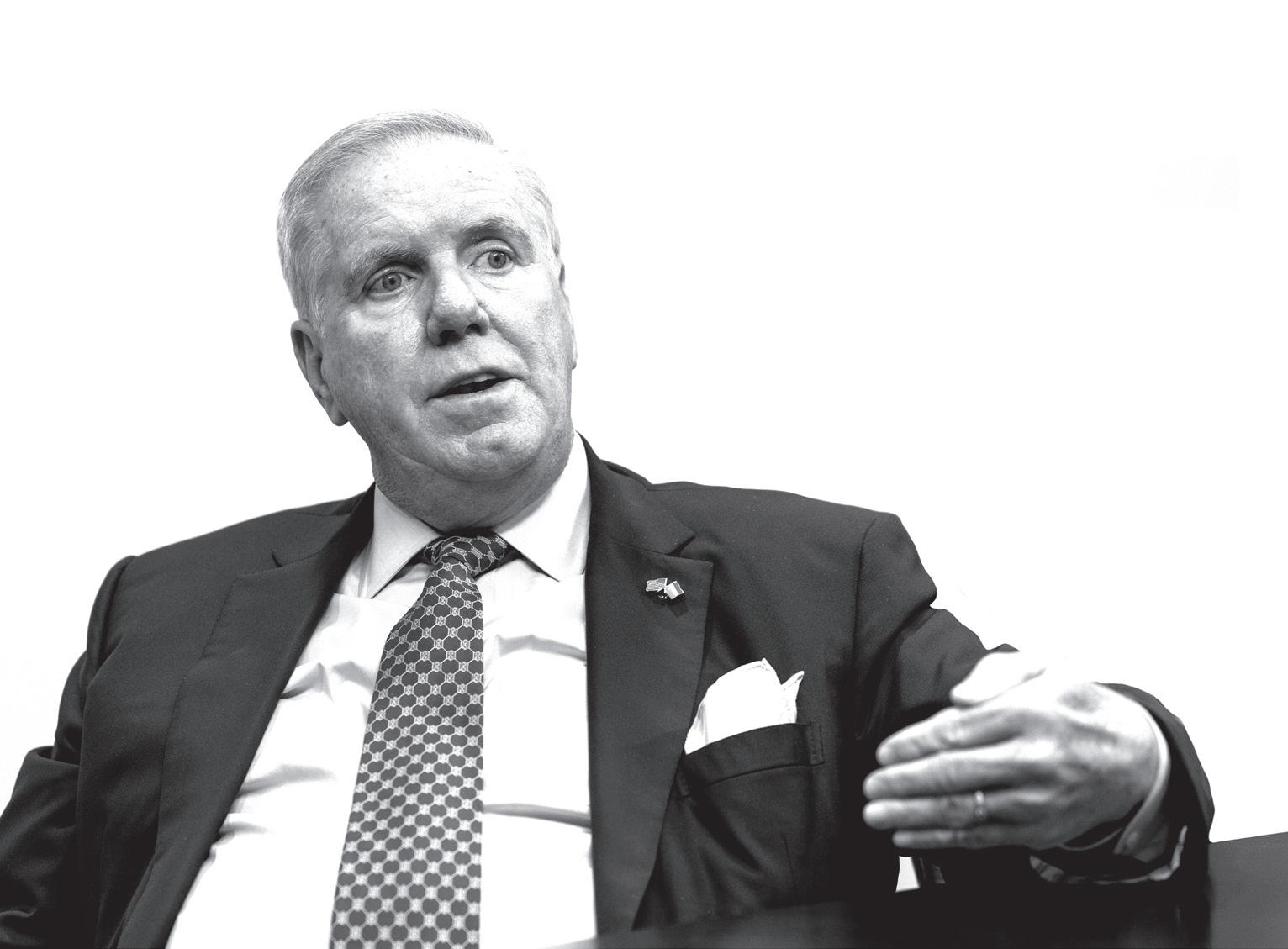
Evans’ approach was different. He visited every town in the country. Met with every mayor. Built strong relationships with gov ernment ministers and got things done.
Evans says he’s most proud of three accomplishments. First, he led the effort to create a partnership between the U.S. and the Luxembourg Space Agency.
“Etienne Schneider, the deputy prime min ister, and I sketched out the memorandum of understanding on the back of a napkin,” Evans says.
Second, he ensured 75th anniversary ceremonies commemorating the Battle of the Bulge were held at the Luxembourg Amer ican Cemetery. And third, and he ensured that the government of Luxembourg made restitution to the families of Jews who had been murdered during the Holocaust. Prior to Evans’ effort, Luxembourg had been the only Western European nation not to have made restitution to the Jewish community.
Not even the pandemic slowed him down. During the COVID-19 lockdown, he co-wrote a book (with University of West Georgia professor Michael Hester), Winning Political Debates: Proven Techniques for Success, that featured a foreword by Gingrich.
When a new administration was elected in 2020, Evans knew his time in Luxembourg was over.
“I felt like I had done my job. I love my coun try, but I was ready to come home,” he says.
He re-entered the Atlanta law community and is now a litigation partner at the Midtown Atlanta firm of Squire Patton Boggs.
18 georgia magazine | fall 2022
I wasn’t content to just be ‘an’ ambassador. I wanted to be the best ambassador, not just in Europe but in the world.
peter frey
Ken Gross JD ’78 Ambassador to Tajikistan
2009-2012
Previous posts included Germany, Nepal, Haiti, Iraq, and Malaysia
Currently in private practice in Washington, D.C. special
After earning his law degree from UGA and practicing in Atlanta for several years, Ken Gross didn’t quite stumble into a role with the Foreign Service. But it was close.

“My office was on the 29th floor, and there was a vacant suite next to us,” he recalls. “I heard some people talking in the elevator, and they were discussing 16th century German poetry. It was fasci nating.”
So fascinating that Gross wandered next door and discovered that the Foreign Service was conducting oral assessments for prospective officers. On a whim, he signed up for the written test, which had to be completed first, and passed it. A few months after that he aced the oral portion and soon found himself in his first overseas post in the U.S. consulate in Frankfurt, Germany.
That was in 1987. He spent two years in Germany; postings in Nepal and Haiti followed, but his career took a significant leap forward in 2002 when he began his tour as deputy chief of mission in Tajiki stan—the embassy’s second in command. Tajikistan, a central Asian nation that earned its independence with the breakup of the Soviet Union 11 years earlier, was a nation in transition.

“I tried to learn as much as I could, but obviously you need to learn the people,”
says Gross. To have conversations with Tajikistan’s people, he learned how to speak Tajiki during his first tour in the country. Like many foreign service offi cers, Gross is multilingual. He also speaks French and German.
“To me, that is the key thing,” he con tinues. “It’s all about people and how you relate to them and how they relate to you.”
The lessons Gross learned about rela tionships served him well during his time as ambassador to Tajikistan from 2009 to 2012.
“I became good friends with the Rus sian ambassador when I was there,” Gross says. The relationship between the U.S. and Russia was less confrontational in the early 2010s, but in nations like Tajikistan, which had been under Russian influence for decades, if not centuries, the geopoliti cal tension was there.
“We met for dinner on a regular basis,” Gross says. “I visited his dacha. It was a good relationship. But you are always aware that while he may be a friend, he’s not like a friend in the States who you can just share everything with. He is doing a job. But as long as you understand that, there are a lot of things you can do with an individual.”
georgia magazine | fall 2022 19
To me, that is the key thing; it’s all about people and how you relate to them and how they relate to you.
Bill Roebuck JD ’92 Ambassador to Bahrain 2015-2017

Previous posts included Israel, Libya, Iraq, and Syria
Currently the executive vice president of The Arab Gulf States Institute in Washington, D.C.
Bahrain is one of the United States’ staunchest allies in the Persian Gulf re gion, but that doesn’t mean Bill Roebuck’s term as ambassador was simple.
He came in a few years after the Arab Spring, a series of anti-government protests, uprisings, and armed rebellions across much of the Arab world, including Bahrain.
Some of the country’s leadership thought the U.S. could’ve done more to calm tensions be tween Bahrain’s government and its people. That made Roebuck’s diplomatic assignment more complicated.

“My job was to walk that fine line—continue to press them on what we thought were important political reforms but also to really build that relationship back up and reassure them that we supported them politically, militarily, and regionally,” he says. “I think we succeeded.”
Roebuck, a North Carolina native, had already served in the Peace Corps in Côte d’Ivoire and taught English in Saudi Arabia before coming to UGA for law school. After he graduated, he put his international experience to further use in the foreign service and was posted throughout the Middle East.
Roebuck had the monumental challenge of serving as acting ambassador to Libya after the 2012 assassination of Ambassador Christopher Stevens in Benghazi. Three other Americans were killed.
In the aftermath of Stevens’ death, Roebuck had to guide security efforts in the embassy in Tripoli.
“We had 85 marines guarding it,” he says. “Normally there might be 12.”
Roebuck also had to shore up the morale of an embassy staff that was devastated by the murder of their former boss, and navigate the tumultu ous relationship with the Libyan government.
“The Libyans were trying to fix things as best they could. And Chris was the kind of person where if you met him once, you felt like he was your best friend.”
Roebuck served as charge d’affaires, or acting ambassador, in Libya from January to July 2013 and stabilized the situation for the incoming ambassador.
Libya was not the only difficult posting for Roebuck. Following his ambassadorship in Bahrain, Roebuck worked in a diplomatic role embedded with U.S. Special Forces battling ISIS in Syria. A well-earned retirement came after that, and now Roebuck is in Washington, D.C., where he serves as executive vice president of the Arab Gulf States Institute.
“It was a perfect step for me,” Roebuck says of his role at the policy think tank, where he contributes to policy papers and leads other communications.
20 georgia magazine | fall 2022
My job was to walk that fine line—continue to press them on what we thought were important political reforms but also to really build that relationship back up.
Read more from Bill Roebuck as he remembers his friend and fellow diplomat Christopher Stevens
NEWS.UGA.EDU/DIPLOMATIC-CORPS special
Lynne Tracy AB ’86 Ambassador to Armenia 2019-PRESENT
Previous posts include Kyrgyzstan, Turkmenistan, Kazakhstan, Afghanistan, and Pakistan
Lynne Tracy, the U.S. Ambassador to Armenia, credits her UGA education for putting her on a path to what is now a nearly 30-year career in the foreign service.
And it started with her first quarter on campus.
It was the fall of 1982, and the Cold War was still raging. Tracy enrolled in a survey history class taught by the late Professor Joe Barrigan. He made a comment during class that Tracy remembers to this day.
“We don’t have enough people who un derstand the Soviet Union,” he said.
From that point on, Tracy dedicated her college career to becoming one of those rare people. She majored in interdisciplinary studies, which allowed her to build a major from a variety of subjects. She mashed up courses in history, Russian language, po litical science, and geography, terming her major, “Soviet studies.”
“Even today, what is important for understanding Russia is demographics and geography,” she says. Tracy’s experience in the diplomatic corps, which has focused on central Asia and the former Soviet Union, allows her to draw on that long-held perspective daily.
After graduating from UGA, Tracy earned a law degree from the University of Akron. Before she could practice, she joined the foreign service where her early posts included Kyrgyzstan, Kazakhstan, and Afghanistan.
In 2006, she began a three-year tour at the U.S. consulate in Peshawar, Pakistan, about 40 minutes from the Afghan border. It was her second time working the assign ment. Her first tour, in 1995, was in the aftermath of the Russian withdrawal. When
Tracy returned, the war in Afghanistan was in full force, and the violence frequently crossed the border into Pakistan.
On the morning of Aug. 28, 2008, gunmen attacked her car, riddling the partially armored vehicle with bullets and shooting out its front tires. Tracy credits her driver’s quick thinking and reflexes for escaping and saving their lives.
Later that day, Tracy was back at the consulate, hard at work.
“I know that if I felt like I couldn’t con tinue that no one would have faulted me,” Tracy says. “But I felt strongly about setting an example.
“We were asking our Pakistani partners not to run away—to stay strong and stand firm and help combat extremists and terrorists. If I had left, that would have not been a good signal.”
In 2009, then-Secretary of State Hillary Clinton presented Tracy with the Depart ment of State Award for Heroism, one of the highest awards given to U.S. diplomats.
That honor could have been a career capper for Tracy, but that, of course, has not been the case. Since then, she has served as deputy chief of mission at the U.S. embas sies in Turkmenistan and in Russia as well as Deputy Assistant Secretary for Central Asia before being named Ambassador to Armenia in 2019. With her current post, she continues her journey though former Soviet republics.

“The thing that has made Armenia such a wonderful experience is the people,” Tracy
says. As befits a skilled diplomat, she polite ly declines to name her favorite part of the country. “They have sustained some heavy blows as a nation: a genocide that killed more than one million during World War I, an earthquake in 1988 that killed 60,000, and a recent war with Azerbaijan where more than 5,000 Armenians died.
“But what I see is a positive spirit and boundless creativity. The country is not rich in resources. They have to rely on their people to be successful. What Armenia has experienced might have crushed anoth er country. But that has not happened. Armenians are resilient, which is a constant source of inspiration for me.”
georgia magazine | fall 2022 21
Armenians are resilient, which is a constant source of inspiration for me.
GM
special
pearl the on the Georgia Coast
by leigh beeson ma ’17
It was a pretty summer day on the Georgia coast. Sunny but with just enough cloud cover that it wasn’t yet stiflingly hot. But the waters were rougher than expected, tossing the researchers around in the skiff like rag dolls.
They’re heading to Romerly Marsh Creek, a site about five miles off the University of Georgia’s Skidaway Island campus and a couple dozen miles southeast of Savannah.
Once the tide recedes, they hop out of the boat—and instantly sink knee deep in the muck. They expected this. But the feeling of mud oozing into work boots or beat-up old sneakers is a sensa tion that just can’t be described in words.

It’s something you have to feel.
But for Tom Bliss MS ’04, the director of UGA’s Shellfish Re search Laboratory, it’s just another Thursday.
Bliss joined Marine Extension and Georgia Sea Grant in 2006, after working on numerous fisheries and wildlife management research projects on the west coast and completing a master’s degree on ring-necked pheasants in Austria.
These days he focuses on something else entirely: oysters. More specifically, Georgia oysters and how to revitalize the state’s once-thriving industry.
22 georgia magazine | fall 2022
Decades ago, the state’s oncethriving oyster industry collapsed. UGA researchers are working hard to bring it back.
peter frey
 Tom Bliss, director of UGA's Shellfish Research Laboratory on Skidaway Island, wades through knee-deep muck at Romerly Marsh Creek. The oar he's carrying will be used as a temporary surface to walk on while tossing bags of oysters along the shore.
Tom Bliss, director of UGA's Shellfish Research Laboratory on Skidaway Island, wades through knee-deep muck at Romerly Marsh Creek. The oar he's carrying will be used as a temporary surface to walk on while tossing bags of oysters along the shore.
A Once-Booming Oyster Industry
Native Americans began harvesting and eating oysters thousands of years ago. The marketing and sales of oysters in the British colonies dates back to around the 1600s. The state of Georgia didn’t catch on to the industry until nearly 300 years later.
“Fishermen overharvested the areas up North,” Bliss says. “You can track how oys tering marched down the East Coast as they overharvested all the way down.”
Eventually, Georgia became the prime spot for oyster harvests in the early 1900s. At its heyday, the state harvested 8 million pounds of oyster meat each year.
But by the 1930s, overharvesting and envi ronmental degradation had taken its toll on Georgia waters. And the decreased demand for oysters, coupled with increased labor costs, hit the coast hard.
The canneries that relied so heavily on Georgia’s shellfish shuttered. The shucking houses up and down the state’s coast followed. An entire fishing culture collapsed.
But all hope wasn’t lost.
Enough of the ecosystem remained intact to support the small population of oysters that survived.
“Georgia is lucky because we have so many twists and turns and deep estuaries in our wa terways that although they overfished areas, they didn’t get to all of it,” Bliss says.
Another geographic feature, Georgia’s warmer waters, helped the under-the-radar oyster population bounce back more quickly than it would in the Northeast.
“After the ’60s when harvests pretty much stopped, oysters were able to rebound, and now this area is one of the healthiest wild pop ulations,” Bliss says. “We got saved by biology.”
Above: Randsey Summerford, a 16-yearold oyster farmer from Georgia, spent his nights on a little boat collecting oysters in the early 1900s. In its heyday, the state harvested 8 million pounds of oyster meat each year.

24 georgia magazine | fall 2022
lewis wickes hine, january 1909/library of congress
Nature’s Bad Weather Buffer
Bliss and John Pelli, an aquaculture extension agent based at UGA’s Skidaway campus, drag bags upon bags of oyster shells from the boat onto the edge of the creek. Right now, the bagged shell look a bit out of place, but once the tide rolls in, the bags will be submerged by a couple of feet of water.
As the summer progresses, wild oysters will release their offspring in larval form. The baby oysters then find a place to settle, permanently attaching themselves to a hard surface. Frequently, they cling to older oyster shells, which creates the giant, tight clumps of oysters that characterize the Georgia coast.
The shells Bliss and Pelli are tossing into the shallow waters are part of a larger
project between the university and the Georgia Department of Natural Resources to determine the best means of rebuilding these natural living shorelines.
The oysters are pretty good at rebuild ing on their own. But the researchers are hoping to help give them a head start by providing the perfect place for larva to cement themselves.
As the baby oysters grow, they’ll form large clumps that are difficult to pry apart with your bare hands.
Over time, the oysters build reefs that protect Georgia’s salt marsh estuaries from adverse weather and tides, buffering wave energy and guarding against erosion. They also provide an enticing habitat for fish,

clams, and crabs. Because of the variety of aquatic life, fishermen are drawn to the reefs as well.
The reefs also improve water quality. But over the years, the reefs were degraded and sometimes even removed entirely, leaving the shoreline vulnerable.
The researchers will venture out again in a few weeks with more shells. But those will already have baby oysters, or spat, attached to the shells. In theory, putting spat on shells could jumpstart the reef forma tion process. If it works, coastal counties would no longer be limited to restoring reefs during the shellfish’s narrow summer spawning season.
peter frey
Tom Bliss (left) and John Pelli lay bags of oyster shells along the shallows of Romerly Marsh as part of a research collaboration with the Georgia Department of Natural Resources.
A Shellfish Makeover
While wild oysters may help rebuild Georgia’s reefs, they have limited appeal for consumers.
“Our wild oysters that grow out there are good for the shucking market, an oyster roast, or canning,” says Mark Risse, director of Marine Extension and Georgia Sea Grant and Georgia Power Professor of Water Poli cy. “There isn’t much consumer preference for them because they’re long, skinny shells with sharp edges. If you went to a grocery store or restaurant and asked for a dozen oysters, you wouldn’t want them to give you one big clump of oysters.”
Still, Justin Manley, a commercial fish erman with aquaculture research expe rience, saw an opportunity to sell locally farmed oysters to Savannah restaurants. He founded Spat King Oysters in 2011 and went

to work trying to raise Georgia oysters in a more aesthetically pleasing way.
Of course, there was a catch.
At the time, Georgia didn’t allow spat to be imported from other states, so Manley had to produce his own seed in order to farm, something that took considerable time and effort.
So Manley put PVC pipes out in the marshes, where they’d be covered in spat during spawning season. He brought the sticks back in, removed the spat, sorted them by size, and maintained them in a homemade nursery. Growing the oysters made it possible to tailor the shapes of the oyster shells to make them resemble the famous oysters served on the half shell in so many high-end restaurants.
Spat King was a successful, if short-lived,
venture. After four years, the state’s first oyster farmer wanted out.
“You know how you have to work all the bugs out of a vehicle before the next person buys it?” says Manley, who is now pursuing a doctoral degree in marine sciences from the Franklin College of Arts and Sciences.
“I was the first edition, and there were plenty of bugs.”
But those bugs got Manley talking with other industry folks and with university researchers about how the university could support this burgeoning industry’s need for oyster spat.
Those conversations led to the creation of the state’s first oyster hatchery at UGA’s Skidaway Island campus. It also led to a gig for Manley to get back in the business of baby oysters as the hatchery’s manager.
26 georgia magazine | fall 2022
peter frey
Left, Justin Manley, the manager of Skidaway's oyster hatchery, knows first-hand the struggles facing Georgia oyster farmers. When he opened Spat King in 2011, Manley became the state's first oyster farmer. Above, Manley holds a bin of baby oysters or spat.


Finding a Balance Between Industry and Nature
Founded in 2015, the Shellfish Research Labo ratory’s hatchery is a collaborative effort that in cludes Marine Extension and Georgia Sea Grant, the Georgia Department of Natural Resources, and the Georgia Shellfish Growers Association. The hatchery produces between 5 and 7 million spat per year, with a potential future value of more than $1 million in annual sales on the half shell market.
It’s a good start for the relatively small op eration, but the dream is to cultivate a thriving Georgia oyster industry—one that can sustain itself and make the commercial arm of UGA’s hatchery obsolete.
Bliss would like to see more fishermen get into the oyster farming game as a counterbalance to their current operations as well, whether they’re catching fish or clamming. Farming oysters on the side could help them withstand the kind of market swings that see clams drop to as low as 10 cents apiece.
“If you haven’t planned for that, it has wiped people out,” Bliss says. “Hopefully, the oysters can give that balance between different shell fish and help them weather the storm. Market demand for oysters has stayed high, even coming out of the pandemic. There’s good potential that farmers should do fine.”
While it’s unlikely the state will see the intense demand for wild-harvested oysters from the canning industry again, the growing market for farmed Georgia oysters offers a new frontier for coastal fishermen. Georgia’s less populated coast and abundant clean water make the state an ideal location for increased oyster farming. Bliss and his team have seen significant interest from new farmers wanting to start operations in Georgia, as well as growers from other areas wanting to move their operations here.
Farming oysters also means more of the coastline’s natural oyster reefs could be left alone to do what they do best: protect the beautiful Georgia coast.
georgia magazine | fall 2022 27
Join the university’s commitment to growing Georgia’s oyster industry by making a gift to the Shellfish Research Laboratory Research Fund. GIVE.UGA.EDU/SHELLFISH
peter frey
GM
An Oxford Education

28 georgia magazine | fall 2022
Education
Even for the jetlagged, the first look at city centre in Oxford, England, is an eye-opening and jaw-dropping experience.
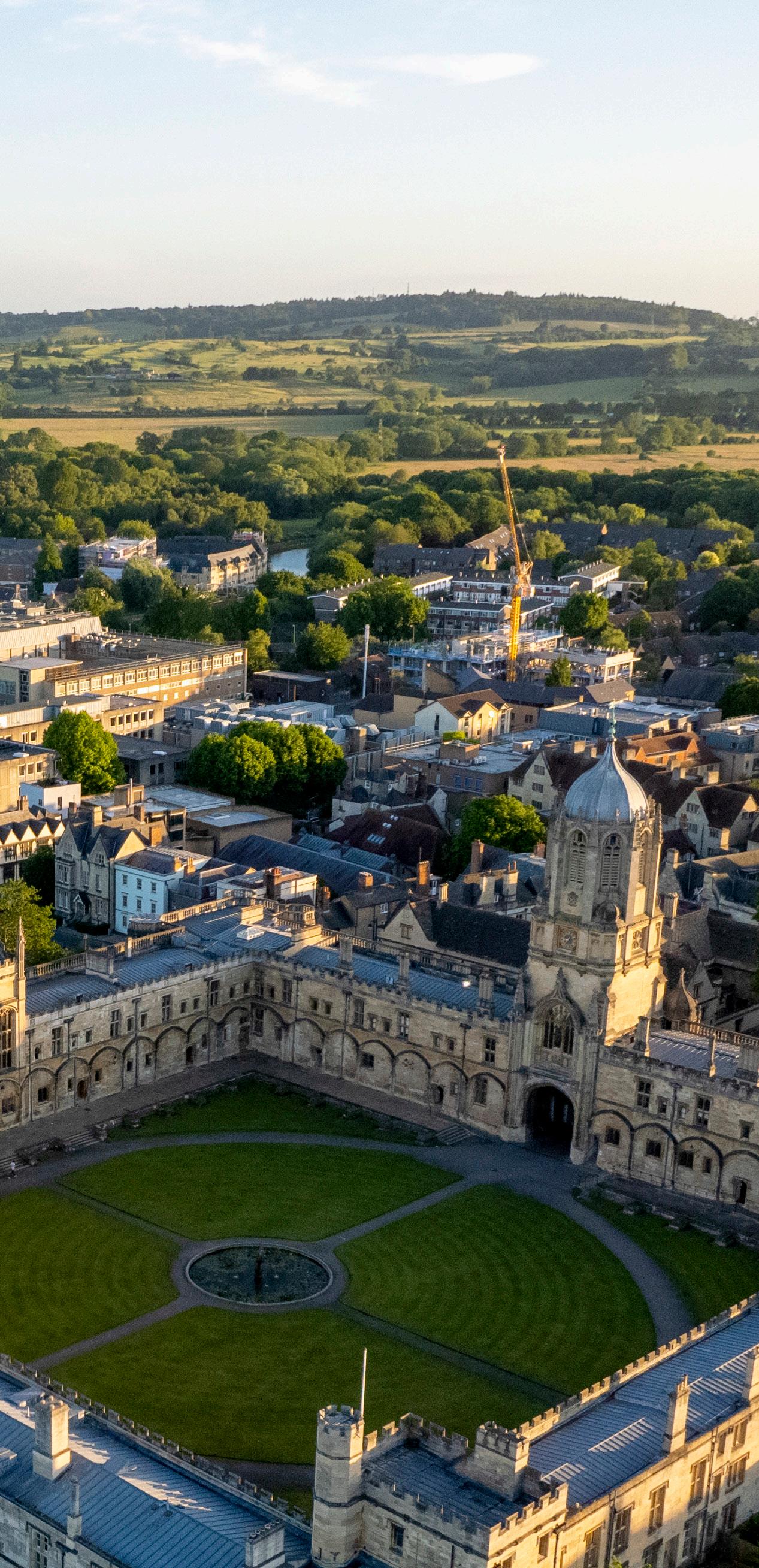
As you stroll block by block, architecture spanning Saxon, Gothic, Neoclassical, and Victorian periods rises overhead. Chapels, towers, libraries, and halls built for the oldest of the University of Oxford’s 39 colleges com pete for grandeur. The resulting cityscape inspired the Victorian poet Matthew Arnold to call Oxford the city of “dreaming spires.”
With a mixture of awe and exhaustion, 17 newly arrived University of Georgia students tour these streets on a balmy June afternoon. They haven’t yet recovered from their eight-hour overnight flight from Atlanta. But their lively tour guide, Oxford townie Debbie Gerrans, is determined to hold their attention. She manages admira bly, taking them on an hour’s jaunt to get familiar with their home for the coming weeks. The sites and stories she weaves certainly help. She shows them where J.R.R. Tolkien boarded as a student, C.S. Lewis went for a pint, and filmmakers shot parts of the Harry Potter series.
As the tour draws to a close, Gerrans offers a piece of advice. Noting all the sky ward craftsmanship and artwork on build ing exteriors and vaulted dome interiors, which relentlessly surprise and delight, she tells them, “Don’t forget to look up.”
It’s good advice for any visitor to Oxford but perhaps especially for UGA students, who will spend much of their time with their heads down. With courses taught by a mixture of UGA and Oxford faculty, the academic workload here pushes even the most capable students. Those who embrace the challenge return stateside sharper and more confident.
georgia magazine | fall 2022 29
written by aaron hale ma ’16 photographs by dorothy kozlowski bla ’06, abj ’10
The birthplace of public higher education in America meets the world’s oldest English-speaking university.
Katie Beard, a UGA history and international affairs major, walks to her tutorial at Christ Church College with Rowena E. Archer, a medieval historian at Oxford University. Beard came to Oxford with a fascination for British history. She came away with skills from tutorial sessions sure to serve her for years. “It’s definitely made me more comfortable with public speaking and thinking on the fly,” she says.
Beneath the blank stare of an armored helmet, Katie Beard, a history and international studies major, finds a cushioned armchair in a charming ly cluttered office. Books and medieval artifacts abound. Beside her, a sheathed knightly sword leans near an electric kettle. A window overlooks the vast Tom Quad at Christ Church College, founded by Henry VIII just before his death nearly 500 years ago. Beard, however, is focused on another time and another place.
A silver-haired medieval historian, Rowena E. Archer, takes a seat next to Beard for their tutorial to begin. It’s time for Beard to show what she knows.
Though UGA at Oxford offers several shorter summer programs, its signature offerings are 12-week semester-long programs in which students take one-on-one tutorial courses with Oxford faculty.


Tutorials are a style of instruction unique to Oxford and its sister university, Cambridge. They consist of weekly meetings with an esteemed faculty member and usually only one or two stu dents. Students, not tutors, do all of the prepa ration. They show up ready to read aloud a 2,000word essay or deliver an in-depth presentation based on assigned readings.
In this tutorial, Beard reads her essay about the medieval poet Christine de Pizan, known as the only professional woman writer of her time. And for the rest of the class, her tutor probes Beard’s ideas and arguments.
At this point late in the semester, Beard is ready to defend her positions and articulate what she’s learned. And when she doesn’t know an answer to a question, Beard doesn’t improvise or offer an excuse; she asks for the answer or where she can find it for herself.
Tutorials are universally intimidating for students, at least until they get the hang of them. Students prepare every class to be put on the spot and must be ready for any mistakes to be pointed out. No excuses. No weeks off, or the tutors will know.
“They tend to be kind of brutally honest as a style of teaching to make sure you’re able to defend anything you say, and you don’t make any baseless claims,” says Nicholas Kreitz, a student in the 2022 spring semester program.
That’s enough motivation for students to work arduously and efficiently to make the most of the opportunity.
30 georgia magazine | fall 2022
a personalized way to learn
the story of uga at oxford
Over the years, Oxford has hosted thou sands of Georgia students. It all started with one UGA English professor in the 1980s.
Judy Shaw was a mid-career academic when she began to rethink how students could connect with literature. She reached out to the University of Oxford, which agreed to let Shaw bring 13 students over in the summer of 1989.

That summer program turned into a semester-long program as students began attending courses at the same time as Oxford students. Over the years, Shaw built an in valuable partnership with David Bradshaw, a fellow at Oxford’s Worcester College. Brad shaw recruited other Oxford faculty to the program to expand the range of disciplines available for study.
Eventually, the program opened to students of all UGA’s schools and colleges. University of Georgia students garnered a reputation among Oxford faculty for their enthusiasm and hard work.
Shaw went on to become UGA’s as sociate provost
for international education before retiring in 2009. Her legacy remains in Oxford.
To this day, the University of Georgia provides a rare opportunity for students to engage with this prestigious university. While many other institutions bring their students to Oxford, UGA is one of only three American institutions—and the only public— to provide Oxford faculty-led tutorials. Stan ford University and Williams College are the other two.

These days, Jamie McClung MA ’01, PhD ’09 (below) runs the program. With dark eye brows and a clean-shaven head, McClung has become a recognizable face around Oxford over the years. Whether he’s walking into a dining hall or down a street in the city centre, it’s likely that someone will recognize the mellow, gregarious Yank and strike up a conversation.
McClung first visited Oxford as an English literature grad student at UGA and fell in love. After completing his doctorate, McClung embarked on the traditional academic career path to become a professor when the program started looking for an associate director.
“I thought, ‘Heck, the job market is tough in English literature, and maybe I can have a bigger effect on an institution beyond teach ing classes by helping develop programs,’” McClung says.
McClung does that and more. He’s a student recruiter, travel agent, relationship builder, tour guide, and fixer when issues inevitably arise.
When the pandemic hit in 2020, McClung ensured students made it home safely.
And then things went silent.
The UGA at Oxford Centre sat nearly emp ty for almost a year and a half. Each semes ter, McClung and the program staff in Athens would prepare for possible participants, but a spike in cases or the introduction of a new variant kept the program closed.
Finally in fall 2021, the program welcomed students again.
“It was really nice to have them back,” says McClung, who was so busy making contin gency plans that he never stopped to consid er how quiet the UGA Centre in Oxford had become. “It really hit all of us when we finally had a group of students back over again.”
georgia magazine | fall 2022 31
Jamie McClung, above, with UGA students at the Convocation House in Oxford University’s Divinity School.
live, work, play
As COVID protocols receded, students gained greater access to all Oxford offers, including its stunning study spaces.
When it’s time to research, read, and write, students can take their pick of fa vored spots to work.
Historic or modern, ornate or sterile, dead silent or chatty with the occasional screech of a café milk steamer, the Univer sity of Oxford offers more than 100 libraries
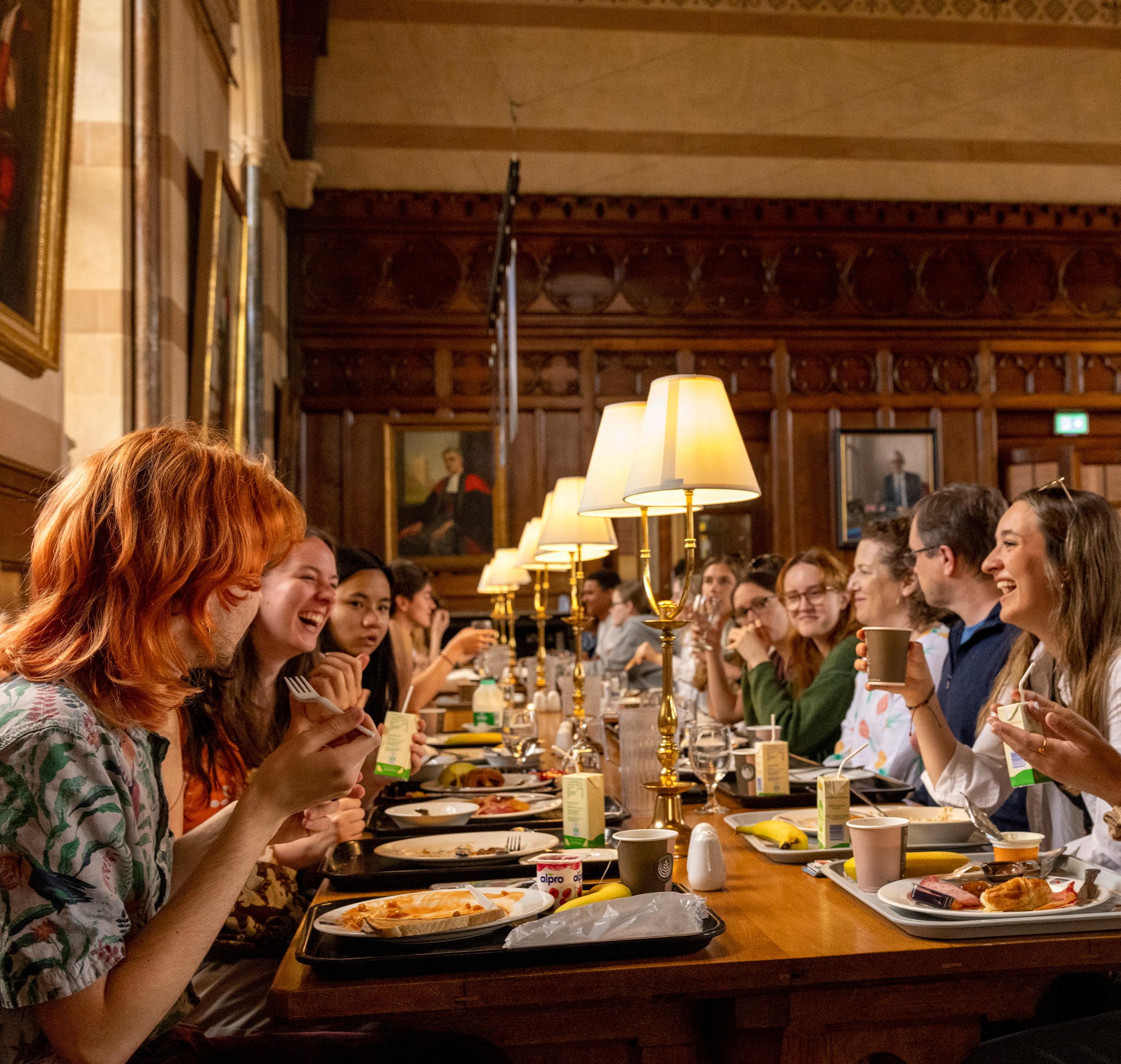
to find materials and get work done. There’s even a website that points scholars to their ideal atmosphere and amenities.
For spectacular ambiance, there’s the Bodleian Old Library, one of Europe’s earliest, or the Radcliffe Camera, a stunning circular-domed building with plenty of win dows to let in natural light. Both libraries enforce a strict policy of silence.
Katie Beard usually skips the beauty and
heads down to the Gladstone Link, a tunnel connecting the Bodleian and Radcliffe Camera and houses history texts. Nick named “the Glink,” it’s basically a bunker for history buffs.
For a more relaxed setting, students have the UGA at Oxford Centre, where most also live during their stay. The 19th-century Victorian mansion has its own library, sem inar room, computer facilities, living areas,
32 georgia magazine | fall 2022
UGA students enjoy a Saturday brunch at the Keble Hall, surrounded by portraits of Keble College alumni.
and a lush garden, perfect for reading or writing on temperate days. The UGA Foundation purchased the house, which accommodates up to 42 students, in 2006. The facility makes UGA one of only a handful of American universities with a permanent presence in Oxford, and the only public that runs year-round programming through it.
When students are hungry, the house has two kitchens, but students also have access to the din ing halls at Keble College or Trinity College. The food is good, though it doesn’t hold a candle to UGA’s dining halls. However, Keble Hall’s atmosphere is impressive in its own right, with long lamp-lit tables, raised ceilings, stained glass windows, and paintings of distinguished alumni.
Dining out is always an option too. Contrary to the stereotype, England has plenty to offer foodies beyond fish and chips and savory pies (although those are pretty good here too). Whether it’s traditional pub food at the White Horse Tavern, red curry at Chiang Mai Kitchen Thai restaurant, or some other variety of international cuisine, it’s easy to find a good meal around town.
And even with a hefty workload, students still make time to take in their surroundings and explore. The program offers a variety of excursions, from seeing a play in Lon don’s West End to exploring Roman ruins and Jane Austen attractions in Bath or taking in incredible views at the Jurassic Coast. Some students even use a weekend here and there to catch a train to Paris or a flight to Barcelona, Prague, or Rome.
An Oxford Primer
Teaching in Oxford dates back to the 11th century, making it the oldest English-speaking university in the world. Some of its graduates and faculty (Sir Walter Raleigh, Thomas More, William Penn, and Adam Smith) left their mark on Western civilization. Some of the greatest English-language writers (John Donne, Jonathan Swift, Lewis Carroll, and J.R.R. Tolkien, to name a few) have studied and found inspiration here. The university also claims 55 Nobel Prize winners.
The University of Oxford has 39 colleges. Unlike the typical American university, these colleges don’t necessarily center around disciplines or subject matter (think Terry College of Business or the College of Pharmacy). Instead, they’re some combination of dormitory, Greek organization, and Hogwart’s house. Each college has a campus with a quad, a dining hall, a chapel, classroom space, and a library.
Oxford students apply for colleges based

UGA students go “punting” on a river. Instead of oars, the punter propels the boat by pushing off the shallow river bottom with a pole. It’s a lot harder than it looks.
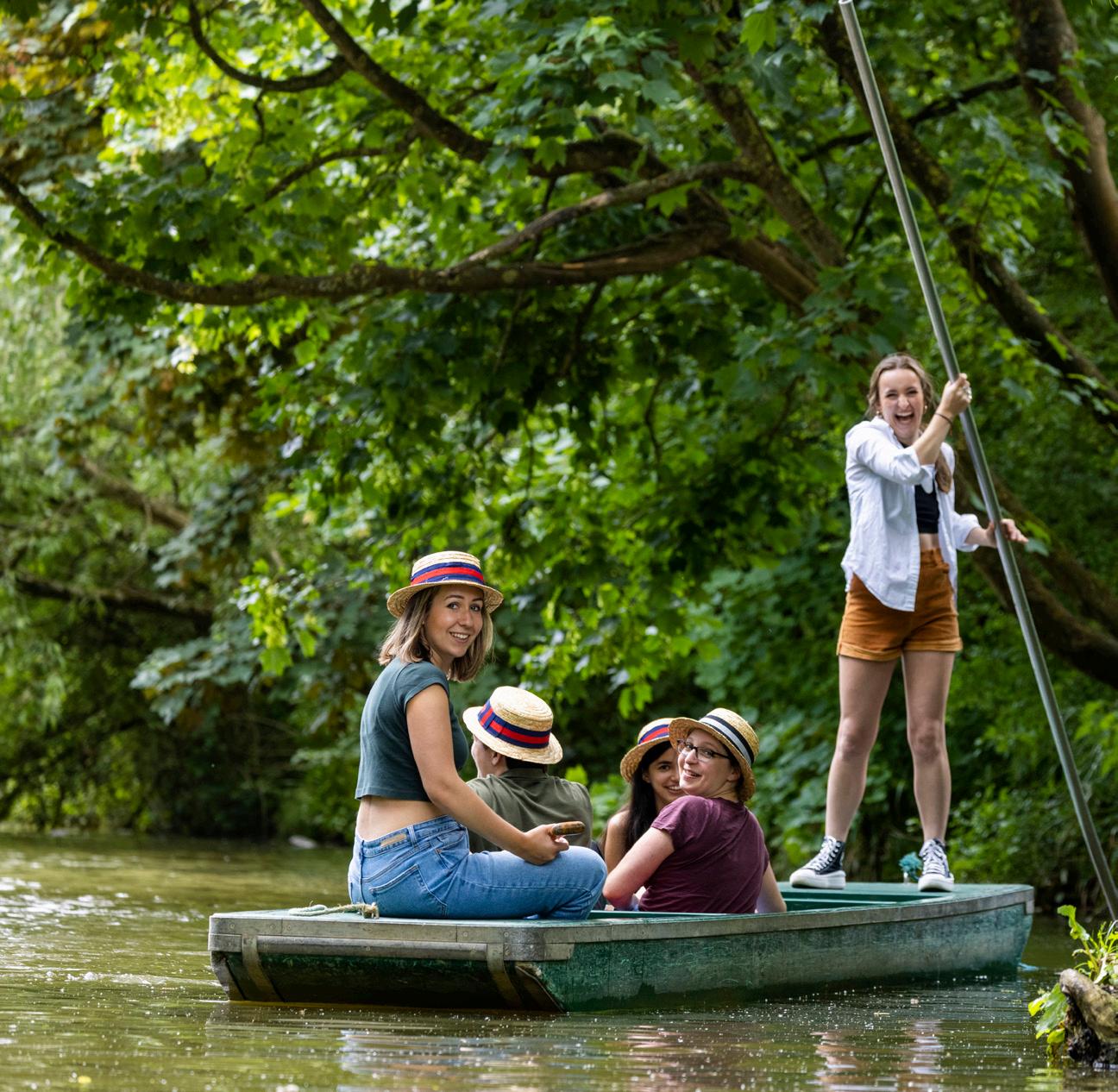
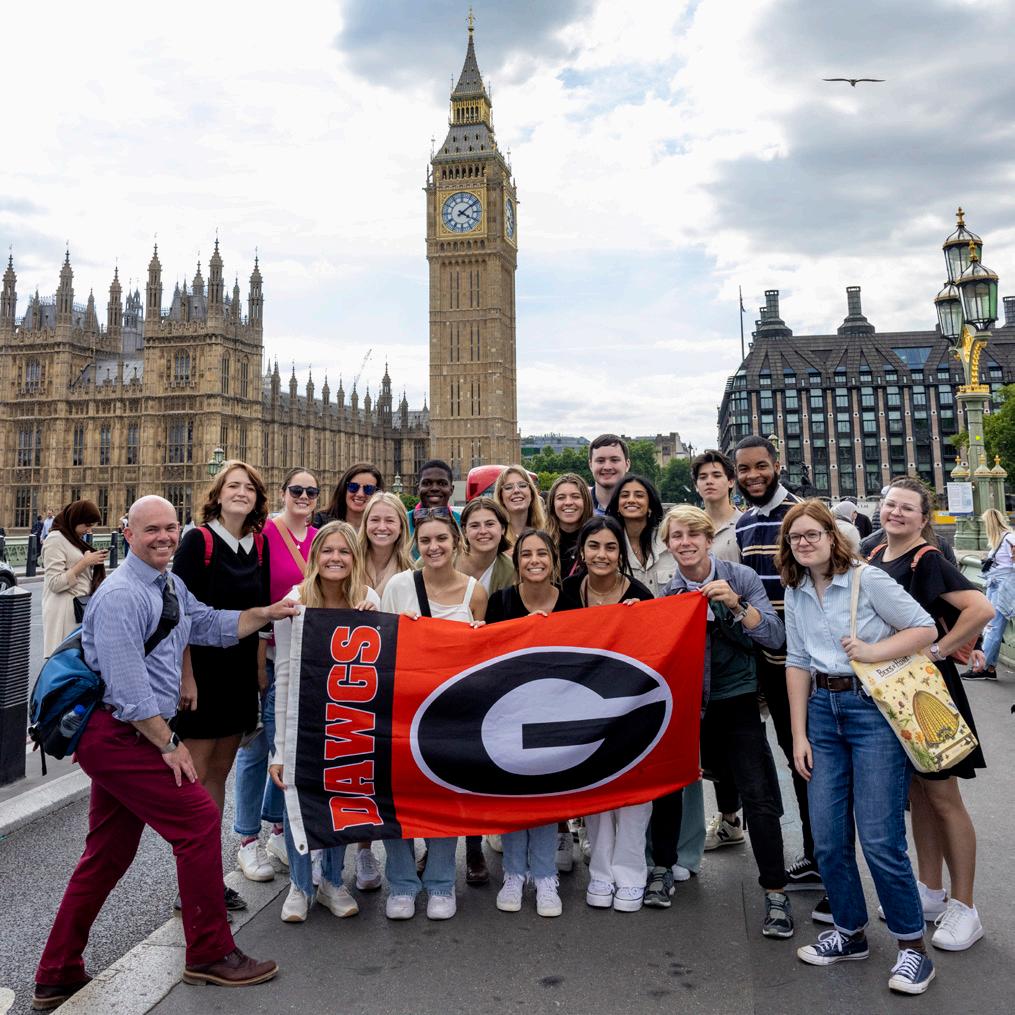
on academic honors, city location, dining hall quality, or social reputation. Magdalene (pronounced ‘Maudlen’) College is known for being “posh.” Merton College has a reputation for serious students. Typically ranked as one of the best academically, it’s often called the college “where fun goes to die.” Keble College has a reputation for inclusiveness and friendliness, and it has an outstanding rugby team.
UGA has close ties with Trinity College and Keble College.
georgia magazine | fall 2022 33
Anisha Goswami, Emily San Antonia, and Rida Basharath pose for a selfie in London.
Junemester 2022 students pose in front of London’s Big Ben.
breadth of program
The UGA at Oxford program is popular with English, history, and religion majors, who can study in a place where so much of their subject matter originated. But the program also welcomes students studying psychology, business, Spanish, biology, computer science, and more.
Semester program students learn in the tutorial format after a few weeks of getting to know Oxford and preparing for what’s coming. Every course, from medieval history and Romantic literature to math and cognitive science, requires students to go beyond surface familiarity with the ma terial. They must put it in their own words, express their own opinions about it, and
defend their stances. That’s tough if you’re learning for the first time about, let’s say, complex neurodegenerative brain diseases.
For some students, it’s an opportunity to think about their subject matter in a new light.

Nicholas Kreitz, a fourth-year data science major, has been acquiring the necessary skills at UGA to be successful in his field. In addition to his coursework, he’s interned with startups and companies through UGA’s Innovation District. He’s thinking about starting his own company someday.
In Oxford, Kreitz got a chance to step back and think about the bigger picture of his chosen field when he took a tutorial
“I think what’s special about the Oxford program is that it truly is a difficult program. And in the term ‘study abroad,’ they really put the emphasis on ‘studying’ abroad. But it’s really rewarding too; I feel this sense of honor to be able to study at the University of Oxford.”
 nicholas kreitz
nicholas kreitz
on computing ethics. The course explored technology’s impacts on society and devel opers’ responsibilities to avoid the worst of them.
“I would basically have an hour-long philosophical discussion,” Kreitz says. “And it was very difficult at first because, in data science, I’m very math based.”
Tutorials challenged him to exercise a different part of his brain, which com plemented his UGA coursework. “I think studying abroad impacted my relationship with my studies, how I approach classes in general, like taking a lot more ownership.”
That mindset makes him more confident in becoming an entrepreneur.
One of the most sought after study areas in Oxford is the Radcliffe Camera, an iconic library built in the 1700s.
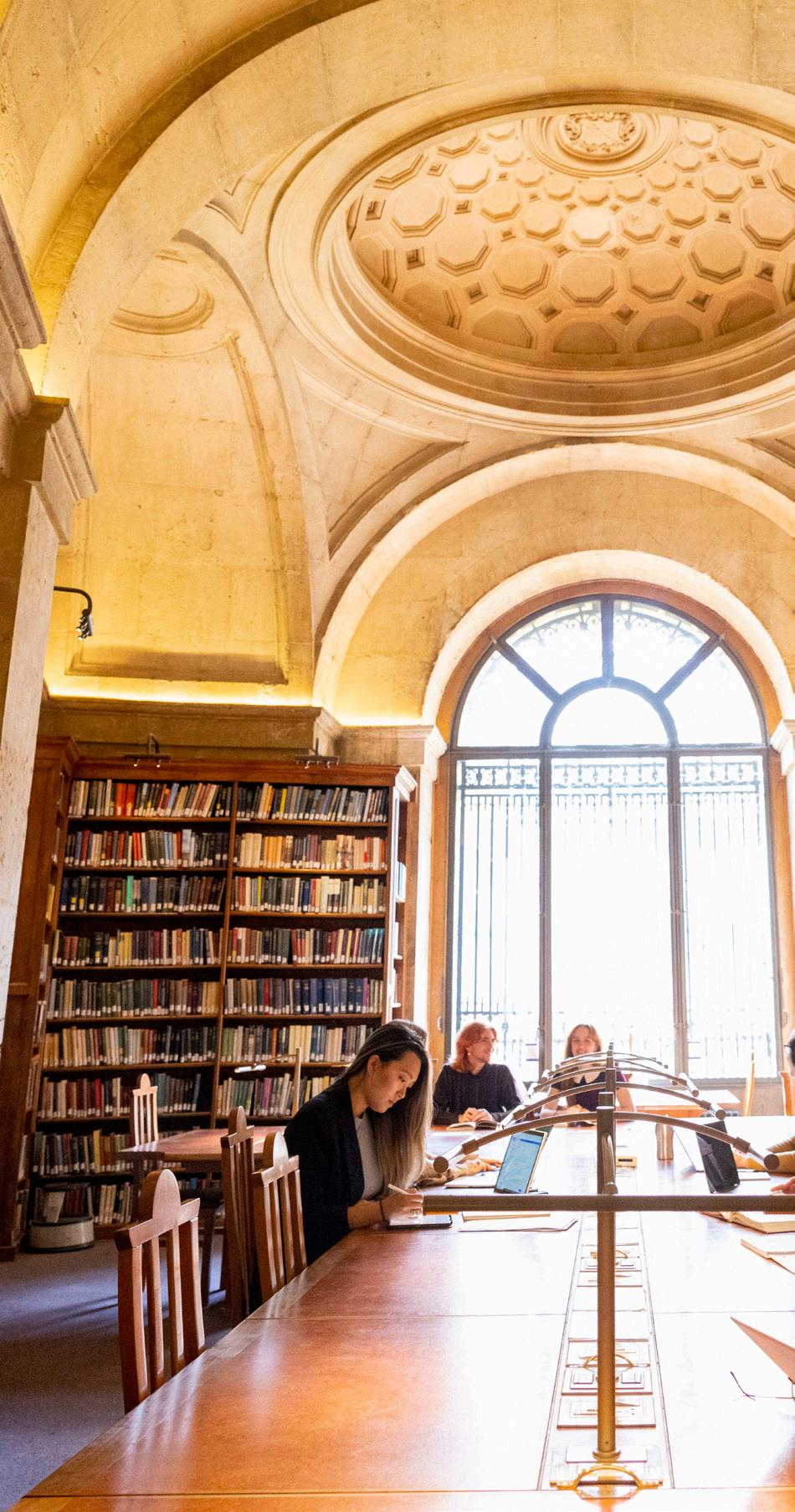
34 georgia magazine | fall 2022
Nicholas Kreitz (right), a UGA data science major, strolls Queen’s Lane near All Souls College with Trudi Sundberg (left) and Isabella Wilson.
finding inspiration
For Eliza White (below), tutorials, and the whole Oxford experience, were just the kind of learning experience she needed.
Before her study abroad experience, White, a cognitive science and psychology major, was in a rut.
The pandemic hit near the end of her first year of college, while she was finishing some of her early requirements in large seminar classes. As she dealt with online courses and increased social isola tion, White found it more and more challenging to connect with the material, her classmates, and even
faculty. She knew she needed something to jumpstart her passion for science.
White is bright and charming, but she can be hard on herself and sometimes struggles to communicate what she knows.
“I knew I was a horrible writer,” she says. “And the content you produce (in tutorials) has to be clear.”
At Oxford, White put herself on the spot. She had to produce. She had to work through issues she perceived as weaknesses.
“There’s no place to hide when your tuto rial is one-on-one,” she says. “That’s what I wanted. I needed individual attention.”
The experience was never easy. At times, she says, she struggled to keep up with the rigorous demands of her Oxford course
A Year of Programs
work. But her tutors adjusted just enough for her to catch up.
White dove into other opportunities too.
To meet Oxford students, she signed up for a couple of clubs: including a caving club that sent her spelunking in caves around England. White was putting herself in tight spots, daring herself to move forward.

She pushed herself well beyond her com fort zone, and she doesn’t regret a thing.
“It’s probably going to help me for the rest of my life,” she says. “And I think I probably will venture out to other places because this was very eye opening about what the world has to offer and how much I was missing out.” GM

The UGA at Oxford Centre (shown below) runs year-round and is open to every major.
• The 12-week semester programs offered in the fall and spring give students the complete Oxford experience. In the first four weeks, students take two seminars with UGA and Oxford faculty and then two eight-week tutorials with Oxford faculty.
• The Oxford and Cortona partnership allows students to get a taste of England and UGA’s campus in Italy.

• UGA’s first-year Foundation Fellows get to enjoy Maymester in Oxford.
• The shortest program is a twoand-a-half week Junemester program, where students take courses and explore England with UGA and Oxford faculty.
• A six-week summer program for students is offered through the Franklin College of Arts and Sciences, the Grady College of Journalism and Mass Communication, and the Terry College of Business.
georgia magazine | fall 2022 35
Commit to providing world-class study abroad opportunities for students in England through scholarship support at OXFORD.UGA.EDU/FUNDING
programs feature UGA course credit and UGA tuition, meaning Zell Miller, HOPE, and other scholarships still apply to help offset costs.
All
written by ireland hayes



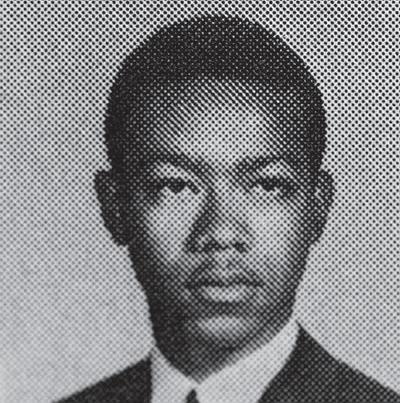


36 georgia magazine | fall 2022 ON THE BULLDOG BEAT UGA Dedicates New Residence Hall Honoring the University’s First Black Freshmen harold alonza black mary blackwell diallo kerry rushin miller
warming chamberlain smith chamberlain smith chamberlain smith
house
Black-Diallo-Miller Hall is the first new residence hall to open at UGA since 2013.
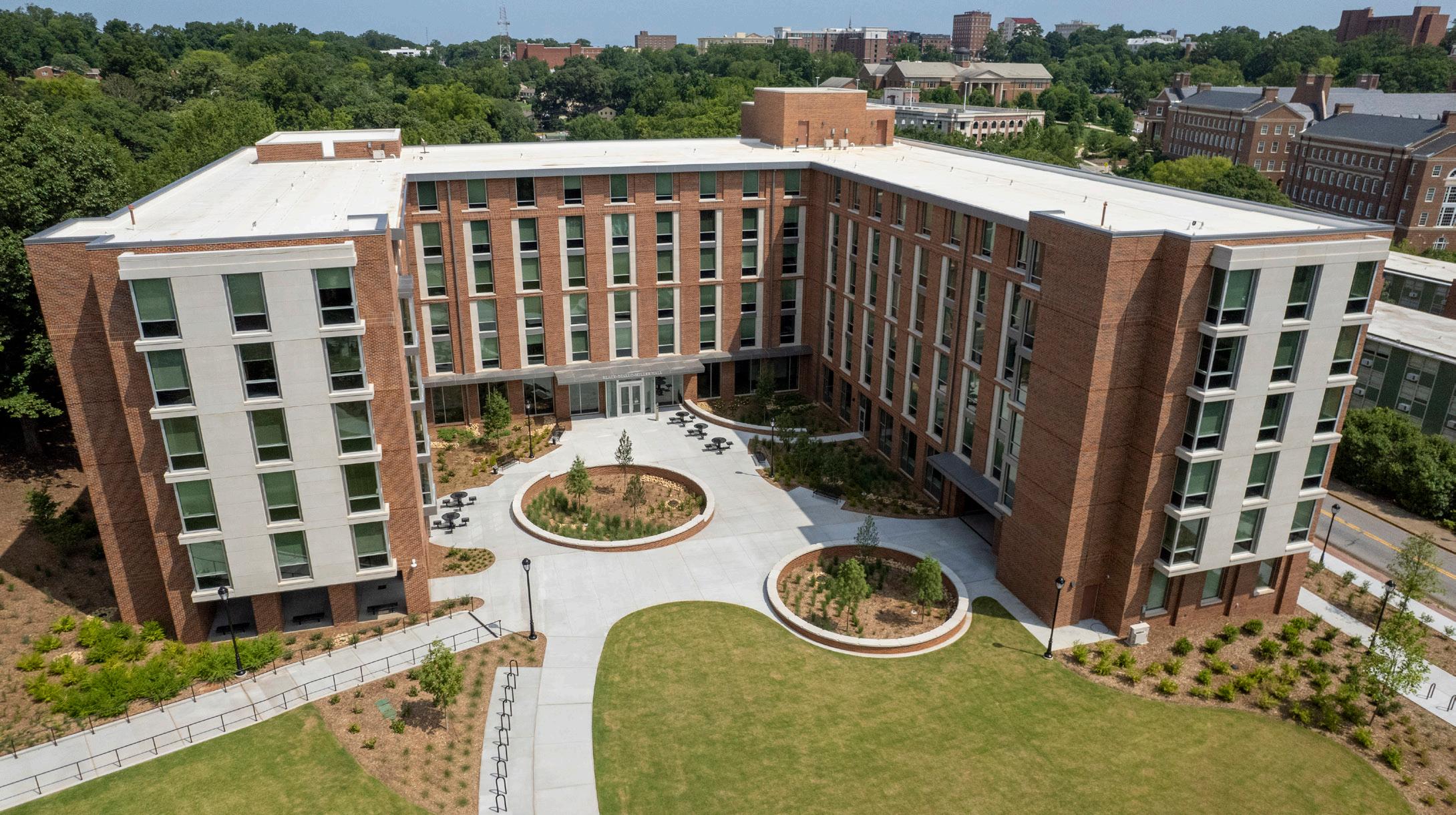
Construction of the six-story building began in December 2020, and features large windows, an exterior courtyard, and modern study and lounge areas.
Aweek before the excitement of freshman move-in at the University of Georgia, a ceremony was held to dedicate the newest addition to the university’s on-campus housing and celebrate the groundbreaking alumni behind it.
The newly constructed Black-Diallo-Miller Hall is named for Harold Alonza Black BBA ’66, Mary Blackwell Diallo AB ’66, MA ’73, and Kerry Rushin Miller BS ’66, who were the first African American students to enroll as freshmen and complete their undergraduate degrees at the University of Georgia.
All three honorees, as well as many friends and family members, attended the dedication and ribbon cutting ceremony on Aug. 5. President Jere W. Morehead JD ’80 and other senior administrators were there to welcome them.
Each honoree made history with their attendance, with Black as the first African American male graduate of the Terry College of Business, Diallo as the first African American student from Athens to enroll at the university, and Miller as the first African American to earn a bachelor’s degree in mathematics from UGA. Each honoree thanked their families and friends for supporting them throughout their academic journey and beyond.
Located on Baxter Street, the hall houses 525 first-year students and resident assistants in double-occupancy rooms. The first class of students moved in this August, which also marked the 60th anniversary of the year Black, Diallo, and Miller enrolled as freshmen.
“It’s going to be almost 60 years to the day that I walked into Reed Hall as a freshman that freshmen will enter this building. I can guarantee you one thing: The atmosphere will be a lot warmer, a lot more welcoming than it was 60 years ago,” Black said during the event. “It was an interesting time, an interesting experience, and I want to thank everyone past and present who helped make that possible.”
The lobby features three portraits of the alumni painted by artist Richard Wilson, which serve as reminders of their important place in UGA history. The alumni and their families saw their portraits for the first time at the Aug. 5 dedication

georgia magazine | fall 2022 37
peter frey
chamberlain
smith
Don’t Miss Out!
WINTER WONDERLIGHTS

Nov. 23, 2022-Jan. 8, 2023
This winter, the State Botanical Garden of Georgia at the University of Georgia will once again transform at night into a wonderland of twinkling lights and dazzling displays. The show follows a half-mile fully accessible trail down Candy Cane Lane, past shimmering snowflakes, through a technicolor tunnel, and past a cone tree forest into a holiday market. This special event is perfect for Bulldogs of all ages. wonderlights.uga.edu
See these events and more at alumni.uga.edu/calendar
2023 BULLDOG 100 CELEBRATION

Feb. 18, 2023
The movers, shakers, and entrepreneurs who own or lead the 2023 fastest-growing Bulldog businesses will be back on campus to find out who will land at No. 1 on this year’s Bulldog 100 list. alumni.uga.edu/b100
NOMINATION PERIODS FOR BULLDOG 100, 40 UNDER 40

Nominations for the 2024 Bulldog 100 are open now at alumni.uga.edu/b100 and nominations for the 2023 40 Under 40 open Feb. 1 at alumni.uga.edu/40u40.




Seeking Passionate Dawgs for Chapter Leadership Roles
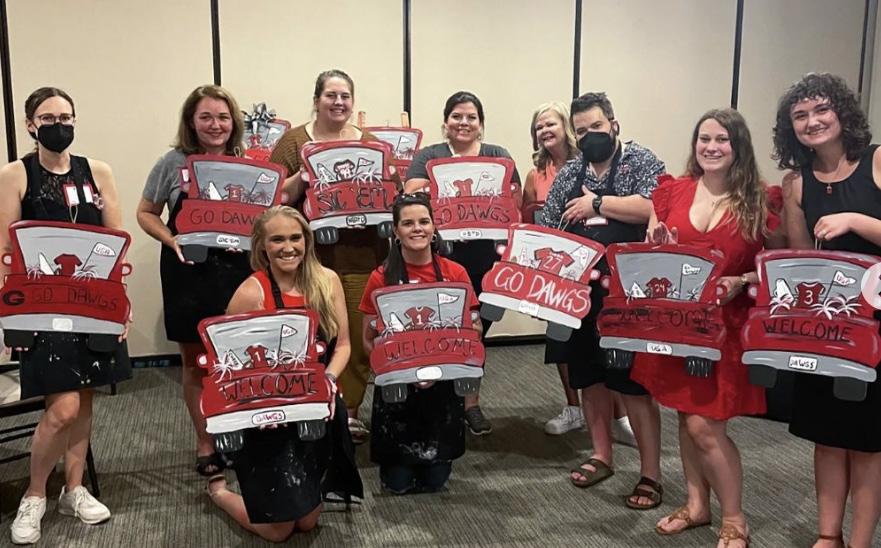
UGA is always looking for passionate and committed alumni to volunteer as chapter leaders. If you are interested in helping a current chapter coordinate programs and events that connect local Bulldogs back to UGA, email alumni@uga.edu. You can view the list of chapters at alumni.uga.edu/chapters.
Chapter Spotlight Find your chapter at alumni.uga.edu/chapters
NASHVILLE ALUMNI CHAPTER
Chapter President: David Fabozzi AB ’09
Number of Alumni in the Area: 3,186
The Nashville Chapter is the sixth largest home to Bulldog alumni outside of the state of Georgia. Dedicated to cultivating a UGA community in Music City, the chapter hosts events for locals and visitors throughout the year. It also has affinity groups tailored to local alumni such as Healthcare Dawgs, Women of UGA, Music Business Dawgs, and Young Alumni. Earlier this year, the chapter successfully raised funds to endow a scholarship that will support a Middle Tennessee student to attend UGA in 2023.
38 georgia magazine | fall 2022 THE NATION
Alumni Trivia






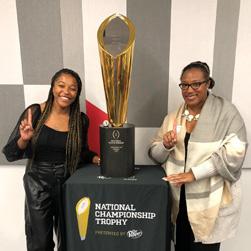



Bulldogs Never Bark Alone!

georgia magazine | fall 2022 39 2023
100
Stay Connected!
on for
and
YEAR-ROUND, WORLDWIDE, AND LIFELONG.
bulldog
revealed
Check out what's going
alumni
update your email or mailing address with UGA.
The latest list of 100 fastest-growing Bulldogled businesses is being released Dec. 7 and features companies from across the country and industries ranging from law to health care to interior design. Check out who made the list at alumni.uga.edu/b100—and in February, the ranked list will reveal which company lands at No. 1.
Test your Bulldog knowledge of alumni events and programs. Answers below—but no peeking! 1. What do the following companies have in common? • Offbeat Media Group • EvoShield • The Social Empowerment Center • Saucehouse BBQ • Terminus Answers: 1. They have all been named the No. 1 fastest-growing business on the Bulldog 100 list. The 2023 Bulldog 100 rankings will be unveiled in February. | 2. 2,984 individuals donated to UGA during Beat Week, including more than 700 students. 2. UGA beat Auburn in the third annual Beat Week giving challenge in October. How many donors supported the campaign and helped UGA get its third consecutive win over the Tigers? A. 1,375 B. 3,890 C. 4,596 D. 2,984
season or
Whether it’s the regular
the postseason, Bulldogs Never Bark Alone! Check out your local alumni chapter’s game-watching parties for the most spirited gameday experience outside of Sanford Stadium. alumni.uga.edu/football
class notes

It’s Showtime
Like a skilled big man making moves in the post, Solomon Hughes’ career has been all about a well-timed pivot.
Hughes PhD ’13 has gone from playing col legiate hoops at the University of California, Berkeley, to pro-baller and member of the Harlem Globetrotters to earning a doctorate and working in academia at Stanford and Duke before scoring the acting role of a lifetime in the Emmy-nominated HBO series Winning Time
The series, which premiered in the spring, dramatizes the story of the Showtime-era Los Angeles Lakers. In his acting debut, Hughes portrays the iconic Kareem Abdul-Jabbar (foreground), one of basketball’s all-time greats whose activism on racial equality and social justice issues helped earn him a Presidential Medal of Freedom.
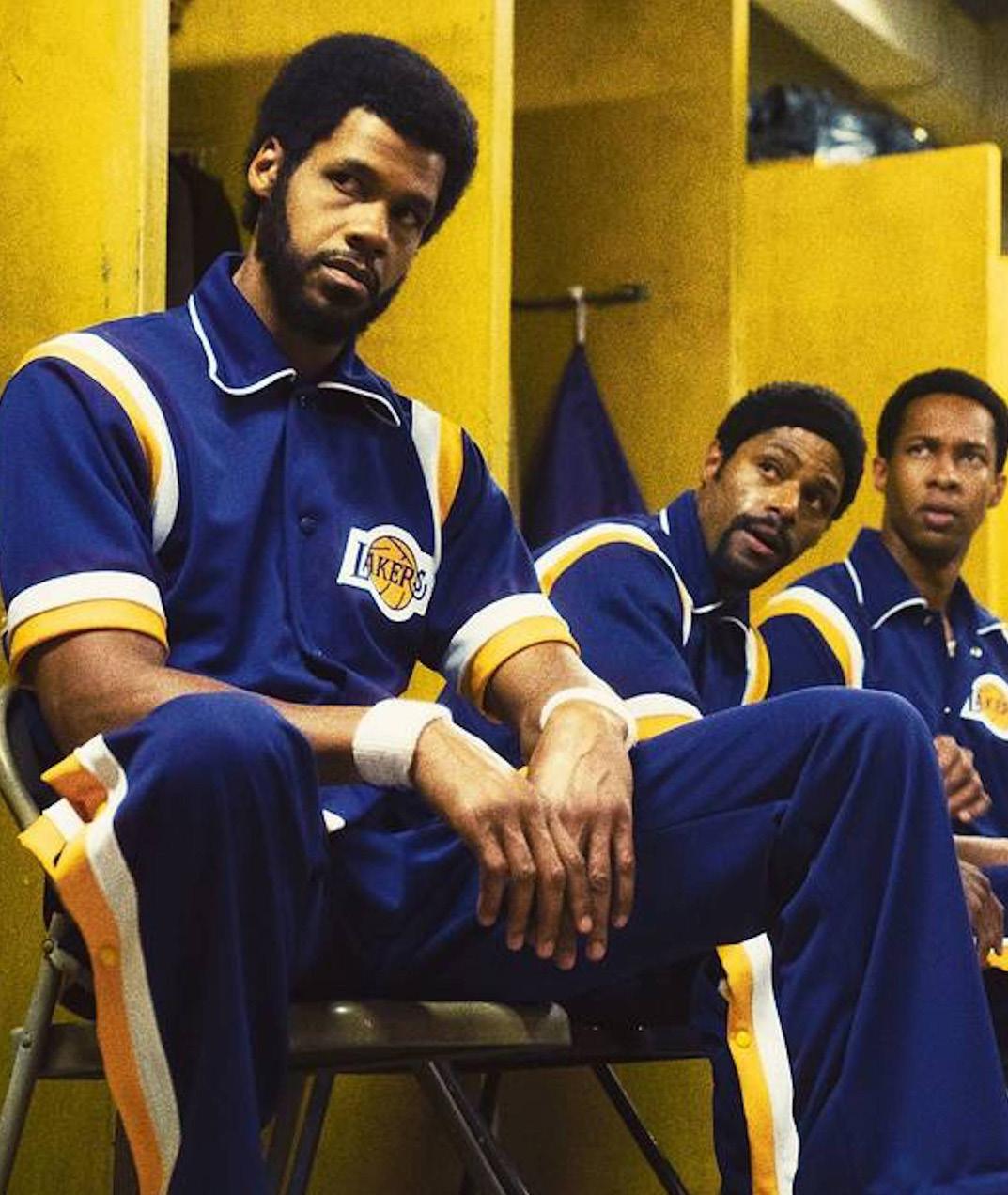
The 6-foot-11 Hughes nails Abdul-Jabbar’s look (especially with the goggles on), but then he fleshes out the character with intelligence, melancholy, tenderness, and natural charisma.
To play the hoops legend convincingly, Hughes had to shake off some basketball cobwebs—he’d been away from the game for a decade—and start working on his skyhook. And in addition to building up his acting skills, Hughes says intellectual curiosity and doctorallevel research skills, which he honed at UGA’s Louise McBee Institute for Higher Education, helped him get into the character.
You could say that Hughes’ whole career had been building up to such a moment.
While serving as a captain on the Califor nia Golden Bears basketball team and leading the Pac-10 in field-goal percentage in 2001 (62.9%), Hughes earned a bachelor’s degree in sociology and then a master’s in education. He played professionally in the United States
40 georgia magazine | fall 2022
CLASS NOTES
Compiled by Ireland Hayes, Rachel Cooper, and Kendal Cano BSFCS ’22
page/hbo
warrick
ALUMNI PROFILE
1960-1964
Ed Nichols ABJ ’62 published
We’ll Talk Some More: A Collec tion of Southern Short Stories in March.
June Johnson BSHE ’63 has re turned to Athens and taken the position of house director at the Zeta Tau Alpha Sorority.
1965-1969
Jerry Swain Jr. BSEd ’68 is the space mission training facility manager for NASA in Houston.
1970-1974
David Crippen BS ’71 is a profes sor emeritus in the Departments of Neurocritical Care and Neuro logical Surgery at the University of Pittsburgh Medical Center.
warrickpage/hbo
Cliff McCurry BBA ’71, an emeritus trustee of the UGA Foundation and Terry College of Business, is the director of com munity development for Sterling Seacrest Pritchard and received the 2022 Legacy Leadership Award at the inaugural South east Leadership Forum held in Savannah.
William Self BBA ’71, JD ’74 received the Judge William W. Treat Award of Excellence from the National College of Probate Judges in November. He retired in May but will continue to serve as a senior judge of the probate courts of Georgia and as a regis tered probate mediator.
Baseball League and American Basket ball Association and in Mexico before suiting up as a Harlem Globetrotter. But when Hughes became disillu sioned with basketball, he returned to academia.
“I was really interested in looking at higher education and what goes on behind the scenes regarding policies around athletics and higher educa tion,” he says.
He talked with faculty members at Stanford, who steered him toward UGA.
“With Georgia, you’re talking about an in stitution that has historically been one of the premier places for exceptional athletics,” he says. “And then the Institute of Higher Ed ucation’s reputation in terms of how much they’re publishing and how influential their work has been in studying higher ed—all of those things factored in.”
Once in Athens, Hughes dove into the work. James C. Hearn, associate director of the institute and Hughes’ major professor, describes him as a “thoughtful, creative, and insightful” student.
“When he said something, people tended to pay attention,” Hearn says.
Hughes focused his research on how col lege athletes chose their schools. Hughes also worked directly with students as an academic counselor at UGA’s Rankin M. Smith Sr. Student-Athlete Academic Center. He came away feeling that UGA’s athletics adminis trators had “legitimate care and concern” for student-athletes.
“I got an inside look at how you support the student-athlete experience, really from the ground floor,” Hughes says. “While on the
other side of campus at the institute, I was considering it from a policy level.”
While finishing his dissertation, Hughes went to work at Stanford in administrative and teaching roles. And then an intriguing opportunity popped up: a casting call looking for someone to play Kareem Abdul-Jabbar in a TV pilot.
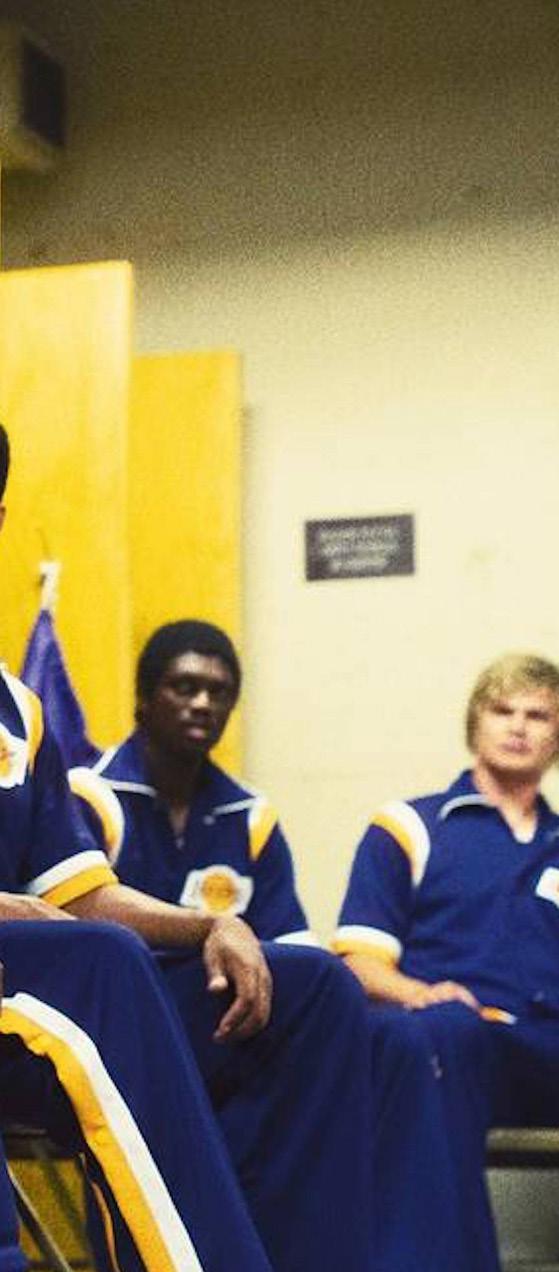

Hughes never had formal acting training or even starred in a high school theater pro duction, but as a child raised in Southern California, acting was always intriguing.
Plus, Hughes grew up watching the Magic and Kareem-era Lakers. His father was an admirer of Abdul-Jabbar’s game and activ ism, and Abdul-Jabbar’s autobiography Giant Steps was one of the first books Hughes read.
He was excited just to get an audition, and then he got the role. Working on the set of Winning Time, alongside Academy Award-winning actors (like Adrien Brody and Sally Field) and crew, was a transcendent experience for the rookie actor.
“I will always be astonished at how wel coming everybody in the cast and the crew was,” he says.
Over the summer, HBO announced it would pick up the series for another season, and Hughes says he’s “all-in” on the acting career now. But he sees this new profession as a natural continuation of his career.
“I feel like this is a form of education to have the opportunity to be part of telling stories,” he says. “It’s a classroom outside the traditional setting.”
’16
georgia magazine | fall 2022 41
Solomon Hughes PhD ’13
written by aaron hale MA
CLASS NOTES
CLASS NOTES
1975-1979
Marc Bruce AB ’75, JD ’78 is opening the law firm of Bruce, Mathews & Lavoie, with Matt Mathews and Andrew Lavoie in Statesboro.
Debbie Day AB ’75 is the CEO of Special Needs Cobb and the 2021 Jack Vaughan Jr. Human Services Award Recipient for Excellence in Leadership.
Richard Harris BSEd ’75 and twin brother Ronald Harris BSEd ’75 were coaches on America’s Next Top Model as the Aswirl Twins. Richard is a member of the Emmaus House Advisory Board and the project facilitator and performing arts program director at the Barack
and Michelle Obama Academy in Atlanta.
Judy Fales ABJ ’76 retired from her position as the director of Burrage Library at Olivet Col lege in Olivet, MI, in May.
Rick Cameron ABJ ’77 was ap pointed senior associate athlet ic director for communications at Mercer University in May.
Jeff Lewis AB ’78, JD ’82 was ap pointed by Gov. Brian Kemp BSA ’87 to serve on the Georgia Film, Music, and Digital Enter tainment Commission in February.

Reece Ritter BBA ’79, MA ’81 retired from Cox Communi cations where she finished a 38-year career in marketing

research and now volunteers with nonprofits.
1980-1984
Constance Brossa ABJ ’83 was reelected to the board of directors of ACES: The Society for Editing.
Chris Gnann BBA ’84 was appointed vice president, sales and marketing for Climax Molybdenum Company, a wholly-owned subsidiary of Freeport-McMoRan in Phoenix, in March.
1985-1989
Kim AsKew BMus ’88 has been an educator for 34 years.
Linda Hurtado Bond ABJ ’89 released her fourth novel, the thriller All the Broken Girls, in August.
1990-1994
Patrick Ballard BSFCS ’91 is the co-founder and CEO of Apex OmniSource in Athens.
Jennifer Phinney BSEd ’91 is the dual enrollment program spe cialist for the Georgia Depart ment of Education.
Arlene Feddo BSA ’93, MA ’05 is the philanthropy training and coaching lead for the global of fice of The Nature Conservancy in Arlington, VA.
Jennifer Prins ABJ ’94 was named to Cambria’s 2021
42 georgia magazine | fall 2022
A Higher Calling
Becoming a justice on the Supreme Court of Georgia wasn’t part of the plan for Verda Colvin.

She was a defense attorney, a represen tative for the people.
“I thought I would never work for ‘The Man’ because I wanted to be on the side of ensuring rights were secured and justice was done,” says Colvin JD ’90. “But when I accepted the offer from my [UGA] mock trial coach, Ken Mauldin JD ’80, to work with him in the solicitor’s office, I found out that I could do so much more as a prosecutor than I ever could as a defense attorney.
“I had the chance at the beginning of the process to ensure that things were fair, that people were treated with respect, and that while there were consequences for actions, people could move on with their lives.”
Prosecution was where she was meant to be, Colvin thought. She worked her way up from assistant solicitor in the Athens-Clarke County Solicitor’s Office to Assistant United States Attorney in the Middle District of Georgia. And that’s where she thought she’d stay until she retired.
“I had it all mapped out, but in walked Michael Moore,” Colvin recalls. Moore was the U.S. Attorney for the Middle District at
the time, and he wanted to nominate her for Superior Court. She had previously been asked to consider the upcoming opening by her supervisor, Sharon Ratley.
Colvin thought about saying no. She was at the top of her game, toward the latter part of her career with one kid about to go to college and another in Catholic school. Superior judges are elected, and if she took this on, she’d leave the job security of her prosecution days behind.
“I thought about something that I told my Sunday School kids. I told them faith and fear can’t reside at the same place, at the same time, at the same level. You’ve always got to choose one,” she says.
Colvin accepted the nomination, becom ing the first Black woman to serve on the Macon Judicial Circuit Superior Court.
About a year after taking the bench in 2015, Colvin was approached by Capt. Ellis Sinclair of the Bibb County Sherriff’s Office about a new program he was starting for at-risk youth. Consider the Consequences shows young people how their poor choices could lead to jail or even death.
Colvin signed on, ready to help young people she feared were “being discarded.”
“Adults have become so intertwined with
their desires, their wants, and the secular things of the world that I don’t think a lot of times kids are getting all they need, pri marily love—that no matter who you are, what you’ve done, I love you. So I would tell the kids that.
“I said, ‘I don’t have to know you inti mately or personally. You don’t have to be mine biologically for me to love you because you’re a part of me. When you all don’t suc ceed, I don’t succeed, and I feel like I failed. I don’t want to fail.”
That commitment to young people and making a difference in the lives of others led Colvin down the path that culminated in Gov. Brian Kemp BSA ’86 appointing her to the Supreme Court of Georgia in July 2021.
The significance of being a Black woman on the state’s highest court is not lost on her.
“Having me on this court shows children who don’t look like the majority that they have value, that they matter, that what they say can count, and that they have the intel lect and ability to serve at our highest level,” Colvin says. “That’s why I think my service is important. It is not about me. It’s about what it can do to inspire, to encourage, and to help us think more broadly.”
georgia magazine | fall 2022 43 CLASS NOTES
peter frey
written by leigh beeson MA ’17
ALUMNI PROFILE
Verda Colvin JD ’90
CLASS NOTES
President’s Circle.
Chris Youmans ABJ ’94 released two songs, Time Waits for No Plan and At Rest, in April.
1995-1999
Jody Smith BS ’96, PharmD ’03 was named the director of pharmacy at Floyd Medical Center in Rome.
Daul Shin BBA ’97 is the director of the artificial intelligence data strategy team at the National Information Society Agency in the Republic of Korea.
Tasha Allen BBA ’99 was named Georgia Chamber of Com merce vice president of talent management and diversity in November 2021.
Joy Mullane AB ’99 is a health care policy analyst at the Defense Health Agency and
graduated with a master’s in health care innovation from the University of Pennsylvania School of Medicine in May.
2000-2004
William Ward BSFCS ’00 is the vice president and general manager in charge of sales and marketing at Madison Chemical Company.
Kyle Hitchcock BSEd ’01 began a new educational award for seniors in Baldwin County who have scored higher than their peers on the ACT test. The award is locally funded from businesses and families in the community.
Kimbrell Smith AB ’03 is the head of school at Atlanta Girls’ School.
Sheridan Watson ABJ ’01 was named deputy public information
officer for the Supreme Court of the United States in May.
Sarah Boehnlein BSFCS ’04 is a real estate agent with HomeSmart CSRA in Grovetown.
2005-2009
Taylor Dibbert AB ’05 was elect ed to the board of the Takoma Foundation in Takoma Park, MD. Andrew Lavoie AB ’06, AB ’06, JD ’09 is opening the law firm of Bruce, Mathews & Lavoie, with Marc Bruce and Matt Mathews in Statesboro.
Josh Stancil AB ’07 is the vice president of marketing for Logical Design Solutions based in New Jersey.
Adair Vilella ABJ ’07 is an account manager at Software Guidance & Assistance in Atlanta.
Herb Cranford AB ’08 is the
district attorney of the Coweta Judicial Circuit, the treasurer of the District Attorney’s Associa tion of Georgia, state represen tative to the National District Attorney’s Association, and in 2020, was appointed by the Georgia Supreme Court to serve on the State Bar of Georgia’s Disciplinary Board.
2010-2014

Matthew Lewis BS ’10 and his wife Kassidy Lewis BS ’12 prac tice dentistry and own Smile Blue Ridge in Blue Ridge.
Allison Shepard AB ’10 is an art teacher at North Atlanta High School.
Sarah Ward BSHP ’10 published her first children’s book, Our NICU Journey, through her fam ily-owned publishing company
44 georgia magazine | fall 2022
Horse Sense
sophomore year, and he devoted his time to his studies. He also acquired a horse, which he boarded at the farm of sociology professor Harold Nix.
After graduating with a history degree, both Pride and his wife, Beth AB ’90, MEd ’92, worked as teachers and coaches in South Carolina. Pride’s interest in horses and racing didn’t subside, though. One summer, he even worked at Delaware Park outside Wilmington.

In 1999, they decided to make a go of it in the horse business and moved to Lexington. Pride started at the very bottom as a groom. The tools of his trade included a brush (for the horses) and a shovel.
Godolphin’s predecessor, Darley, hired Pride in 2002 to manage their stallions. By 2006, he was named CEO of U.S. operations. “I have this theory that if you are trustworthy, and you work hard, and you have basic people skills, you can go a long way,” Pride says.

Horses have taken Dan Pride to some interesting places where he has met some interesting people. Sure, he started his career at the very bottom— shoveling stables. But now he works for the ruler of Dubai and had even met the late Queen Elizabeth II; they discussed one of their shared lifelong passions—horses.
But the royal meet-and-greet circuit is not the reason Pride AB ’91 has spent the last 23 years in the horse racing business.
“It’s a massive cross-section of people who are drawn to this sport—their backgrounds, the socioeconomic status,” says Pride, the COO of Godolphin USA, the North American branch of the largest thoroughbred racing and breeding operation in the world.
“I was drawn to the horse first and the sport second,” he continues. “The horse is what keeps you in it.”
And there is no shortage of horses at Godolphin, where Pride is based at Jona bell Farms. The collection of farms sits on 6,000 acres outside Lexington, Kentucky; it houses about 600 horses and employs more than 150 people. Godolphin USA is part of
the wider Godolphin universe, which spans four continents and was founded by Sheikh Mohammed bin Rashid Al Maktoum of Dubai. Godolphin is actually two different divisions—one for breeding and one for racing. Pride splits his time between them. The breeding side alone is a $50 million a year business.
Pride manages personnel, client relation ships, and talent identification. Talented horses, to be specific.
“You can look at a horse physically. Some times he looks different than everybody else, and he moves differently,” Pride says. “Horses are herd animals, and they have that competitive spirit. There is going to be a hi erarchy, but you never really know until they run in a race.”
Pride grew up around horses in Nashville, where he got his first pony when he was 4.
He came to UGA to play football. A defen sive back, Pride walked on his freshman year. He was a starter on the JV team, and while he suited up in silver britches for the varsity on a couple of occasions, he never took the field.
Pride’s college football career ended his
Godolphin experienced its biggest success in 2021, when its horse Essential Quality (below) won the Belmont Stakes, the third jewel of the Triple Crown. It was the cul mination of a lot of hard work, and while Godolphin did not have a horse run in any Triple Crown races in 2022, Essential Quality is now retired and back in Lexington hoping to sire the next generation of champions.
georgia magazine | fall 2022 45 CLASS NOTES
written by eric rangus MA ’94
’91 ALUMNI PROFILE tim webb tim webb
Dan Pride AB
Supporting Goals
After failing to qualify in 2017 and then weathering the uncertainties of the pandemic, the U.S. Men’s Na tional Soccer Team (USMNT) has punched its ticket for the upcoming Men’s World Cup. One of the leaders in the effort to make sure everyone is healthy is Ron Shinault, the team’s head athletic trainer.
“It’s a real honor to represent the United States. It’s a dream job,” says Shinault BSEd ’01
Still, even a dream job comes with its challenges. This year’s USMNT roster has 27 players who represent clubs in 12 or more different countries. Only working with ath letes in person a handful of times a year makes Shinault’s current athletic training job non-traditional to say the least.
Fortunately, his time at UGA prepared him for the unconventional.
Shinault’s professional journey began in a student sports medicine society meeting his freshman year. After hearing about an internship and interviewing with thenDirector of Sports Medicine Ron Courson, Shinault was hooked.
“I introduced myself to the student lead ing the meeting, Harris Patel,” Shinault says. “He told me there were volunteer and
internship opportunities in the athletic de partment, and I said that’s exactly what I’m interested in doing.”
Shinault’s internship with UGA Athletics took him to the 1998 Peach Bowl, a summer internship with the New England Patriots in 1999, and the 2000 NCAA Women’s Tennis National Championship tournament that UGA won. He completed coursework in the mornings and conducted hands-on sports medicine training with UGA athletes in the afternoons.
“It was a bit of an atypical student ex perience, but it was great sports medicine experience,” Shinault says. “A lot of the people I worked with, I’m still connected with to this day.”
After graduating from UGA, Shinault earned a master’s degree in sports admin istration at Florida State University, then worked in athletic training at several univer sities and at the professional level. Working with the University of San Francisco’s men’s soccer team in 2006 is when the sport and its unique rehabilitation needs captured Shi nault’s interest. His move to Major League Soccer’s San Jose Earthquakes in 2015 brought that further into focus.
With professional soccer’s five-substitutes rule, injury prevention and complete return to pre-injury levels of ability is essential. That makes Shinault’s role even more important.
“In basketball, you can play three minutes of the game or you can play 40 minutes. In football, you can play 3 downs or 45 downs through open substitutions rules,” says Shi nault. “But in soccer, most of your starters need to be able to play the whole game, so players returning from injury have to be healthy and 90 minutes fit.”
By the time Shinault began working with the USMNT in 2019, he knew soccer well. But the global scope of the national team was new.
A few times a year, the USMNT calls in players from around the world to represent the national team in games against other nations. The athletes leave their clubs to practice and compete in a challenging new environment with less-familiar teammates and coaches. One of Shinault’s goals is making the transition as smooth as possible.

“I’m always staying in touch with players and their professional teams, tracking to see how they’re playing, if they had an injury, supporting them if they do have an injury, and working with their professional team,” Shinault says.
He credits Courson, now UGA’s senior as sociate athletic director, for teaching him how to support his athletes—even from thousands of miles away.
“He said it really well: ‘People want to know how much you care before they care about how much you know,’” Shinault recalls.
That means getting to know the players— who they are on and off the field. Only once the players trust their athletic trainers will they listen to how to best rehabilitate their injuries and maintain their health and safety, he says.
Headed into the 2022 FIFA World Cup, Shinault will support players at their big gest tournament in almost a decade. And he won’t be the only Bulldog on the sidelines.
Harris Patel BSEd ’97, the senior Shinault met at his first sports medicine meeting, is also on the USMNT athletic training staff and will join Shinault in Qatar.
46 georgia magazine | fall 2022 CLASS NOTES
written by rachel cooper
isiphotos.com
PROFILE
Ron Shinault BSEd ’01
ALUMNI
Black Hills Golden
Heather Huffman AB ’06 has been in teracting with an intriguing variety of people since she was old enough to stand behind the counter at the Grand Ole’ Creamery, her family’s ice cream shop in St. Paul, Minnesota.

For instance, in 2014, Huffman’s father, Gary, once took a call from President Barack Obama’s staff, who asked for the store to be cleared out for a visit. Believing it to be a joke, Gary ended the call with a laugh.
“Of course,” he said. “And I want a million dollars.”
An hour later, the Leader of the Free World dropped by for a bowl of Black Hills Gold (caramel ice cream with Oreos and pralines). Hoffman remembers the president remi niscing about his first job, which happened to be scooping ice cream. The interaction re inforced a powerful lesson that had already shaped much of Huffman’s life: Where you start has a decisive impact on where you end up. As an economist, Huffman understands the impact someone’s first job has on their life.
“It doesn’t matter if you’re making pizza or scooping ice cream,” she says. “Being able to put a job on your resume is so important in terms of being able to move up in any career.”
Huffman’s mother, Dawn, started the Grand Ole Creamery in 1984 because she had a craving for a chocolate malt with real banana. As a fifth-generation entrepre neur, it’s hardly surprising that Huffman,

a lobbyist, professor, doctoral candidate in economics, and (since 2019) the CFO of the Grand Ole Creamery, has spent her entire professional career advocating for entrepre neurship and small business growth. She may wear many different hats professionally, but one thing she does every day is advocate for small business owners and entrepreneurs.
“Growing up in an entrepreneurial family and working in the family business is what inspired me to pursue a doctorate in econom ics,” she says.
Huffman was born in St. Paul but moved to Duluth, Georgia, when she was two. After graduating at the top of her high school class in 2002, Huffman was excited to see the world. She was unsure at first about attending a university close to her home, but one visit to UGA was enough to change her mind. Huff man was charmed by the campus, especially the music scene, from rocking out at live Widespread Panic shows to meeting musi cian Ben Harper.
“His mother and I are actually friends now,” Huffman says. “She runs a folk music store nearby. I got to see him play live in Athens as a student, and it’s crazy how things have come full circle.”
Huffman graduated magna cum laude from UGA with a double major in Spanish and classics. It was a study abroad trip to Costa Rica that opened her eyes to the real ities of economics. Observing the daily lives
of her host family, Heather learned what it meant to experience entrepreneurship out of necessity. “When there aren’t jobs readily available, people get innovative,” she says.
From running family restaurants to pro viding cosmetology services, Huffman met people who had to get creative for the sake of their families, their livelihoods, and their dreams. That experience stuck with her. Today, she advocates for small business owners and entrepreneurs, especially within the international community.
It turns out that her Spanish degree came in handy in other ways as well. She also uses what she learned to teach economics to Spanishspeaking students. “We take for granted how many textbooks only come in English.”
For Huffman, her Athens experience con tinues to drive her work.
“One thing that made Athens so special is downtown. It’s an entrepreneurial eco system with local businesses you won’t find anywhere else. I often cite it in my research and presentations,” she says. “Where we are located, on Grand Avenue in St. Paul, is another example of the nation’s top 10 en trepreneurial ecosystems.”
written by jayne
roberts
Heather Huffman AB
’06
georgia magazine | fall 2022 47 CLASS NOTES ALUMNI PROFILE
special
special
Little Ward Books, in November 2021.
Adam Wynn AB ’10, BSEd ’10 published his first novel, Black Star, in February.
Mil Sanghvi BBA ’11 has business holdings in residential real estate, property man agement companies, and commercial real estate across three states.

Travis Voyles BSES ’11 was appointed the Virginia Deputy Secretary of Natural and Historic Resources in Richmond, VA in February.
Amber Seymour AB ’12 joined Hunter Maclean as an associate in the firm’s real estate group in April.
Ciara White BSFCS ’12 was promoted to technical facilitator for in-flight services at Delta Air Lines.
Elizabeth Cox BBA ’13, BBA ’13 graduated from the Kellogg School of Management at Northwestern University with triple ma jors in strategy, economics, and managing organizations in June 2021. She started a new position as a consultant at Bain & Company in Atlanta in August 2021.
Emily Fountain AB ’13, ABJ ’13 is an associate at Bass, Berry & Sims in Nashville, TN.
Mamie Shepherd ABJ ’13 is the program manager for Seacrest Studios at Monroe Carell Jr. Children’s Hospital at Vander bilt in Nashville, TN.
Melissa Smith BSFCS ’13, MSW ’15 is a senior care coordinator at Wellstar Douglas Hospital.
2015-2020


Rita Virtanen BSA ’15 is a PhD student at the University of Helsinki in the Klefst röm research group and co-scientific coordinator of CancerIO. She is also vice chairperson of the nonprofit, The Science Basement, in Helsinki, Finland.
Stephanie Mobley BSW ’16 is a bilingual mental health school-based therapist in Riverdale, MD.
Amanda DeLaPerriere AB ’17, AB ’17 is an associate at Blank Rome in Washington, DC.
Corey Knapp ABJ ’17 is the social media coordinator for the Atlanta Hawks.
48 georgia magazine | fall 2022
CLASS NOTES
E
E
T
S o u t
UGA Terry College of Business Graduates | UGA Redcoat Auxiliary Alumni Over 60+ Years of Real Estate & Financial Experience B O N N I E D U N N (706) 614-7360 (706) 340 2242 L I S A M . L A N G F O R D
R
A L
S
A T E
h e r n S t y l e
our georgia commitment
pro dawgs give back through scholarship support
On the golf course, the University of Georgia is leading the way, fielding the most professional golfers on the PGA Tour of any school and dominating tournament leaderboards week in and week out. Away from the links, these UGA alumni are doing their part to create opportunities for the next generation of Bulldogs.
Nearly a dozen former Georgia men’s golfers who compete pro fessionally are supporting the UGA Alumni PGA Tour Professionals
Georgia Commitment Scholarship to give back to students in need. Bonney Shuman BBA ’80, a St. Simons Island resi dent and member of the UGA Foundation Board of Trustees, has been instrumen tal in setting up the fund.
Shuman says it was a logical step to deepen the bond and connection with former UGA golfers, many of whom are her fellow Golden Isles residents. Each fall, several of them participate in the RSM Classic, one of the most beloved events on the Tour’s fall circuit, which draws a large crowd to Sea Island Golf Club.
UGA has long had a strong presence at the tournament. The event’s executive director is Todd Thompson BSEd ‘94, a former Bulldog golfer and the father of Davis Thompson BSEd ’21, who earned All-American honors during his time in Athens before moving on to the Korn Ferry Tour, a feeder for the PGA Tour.
UGA sponsors The Dawg House be tween the 17th and 18th holes at Sea Island’s Seaside course. The space allows alumni and guests to ensure the world’s best golfers get a glimpse of Bulldog Nation—it also sparked the idea to enlist the golfers to rally around giving back to their alma mater.

“The RSM Classic is important to our community, and it brings together a lot of folks to volunteer and support it,” Shuman says. “The tournament team had this idea to get the Georgia golfers, because there are so many of them, and see if there was a way to get them further plugged in to what UGA is doing.”
Since the fundraising initiative began,
GIVE.UGA.EDU
From left to right: Brothers Richard BBA ‘84 and Ed Stamper ABJ ‘83 with PGA golfer Brian Harman BBA ‘11 and Billy Shuman M ‘80 outside of The Dawg House during the RSM Classic at Sea Island Golf Club.

At right, Sepp Straka BBA ‘15 with Uga X, an annual visitor to The Dawg House during the RSM Classic.
Shuman and this group of Georgia golfers have raised more than $50,000 for the fund, which provides a $3,500 annual scholarship to an undergraduate student in need. Recipients are determined by the Office of Student Financial Aid. Shuman sees this as just the beginning of what these dedicated alumni intend to do for UGA.
“We want there to be a next,” Shuman says. “We don’t know what that next is, but we want to build on this program and ensure the golfers’ impact continues to grow. And they do too because they’re really proud of UGA, and they’re really proud of what they’ve done with this scholarship.”
Scholarships support Bulldogs today and for generations to come. You, too, can establish a generous legacy by giving back today.
Harris
Brian Harman BBA ’11
Russell Henley BSFCS ’11
Chris Kirk BSEd ’08
Kevin Kisner BBA ’06
Keith Mitchell BBA ’14
Sepp Straka BBA ’15
Hudson Swafford BSFCS ’11
Brendon Todd BBA ’07
Bonney and Billy Shuman (on behalf of Davis Thompson BSEd ’21)
georgia magazine | fall 2022 49
CLASS NOTES
courtesy of bonney shuman
CLASS NOTES
GOLFERS SUPPORTING THE UGA ALUMNI PGA TOUR PROFESSIONALS GEORGIA COMMITMENT SCHOLARSHIP:
English BSFCS ’11
courtesyofbonneyshuman


50 georgia magazine | fall 2022 Call (706) 542-2134 ask for the special alumni room rate and tickets to Winter Wonderlights Nov. 23, 2022 – Jan. 8, 2023
Homegrown
When Stuart Cofer BBA ’81 drives around his hometown of Athens, there are two things he can point out: the flowers purchased from his family’s plant nursery and all the changes that have been made since he was a kid.
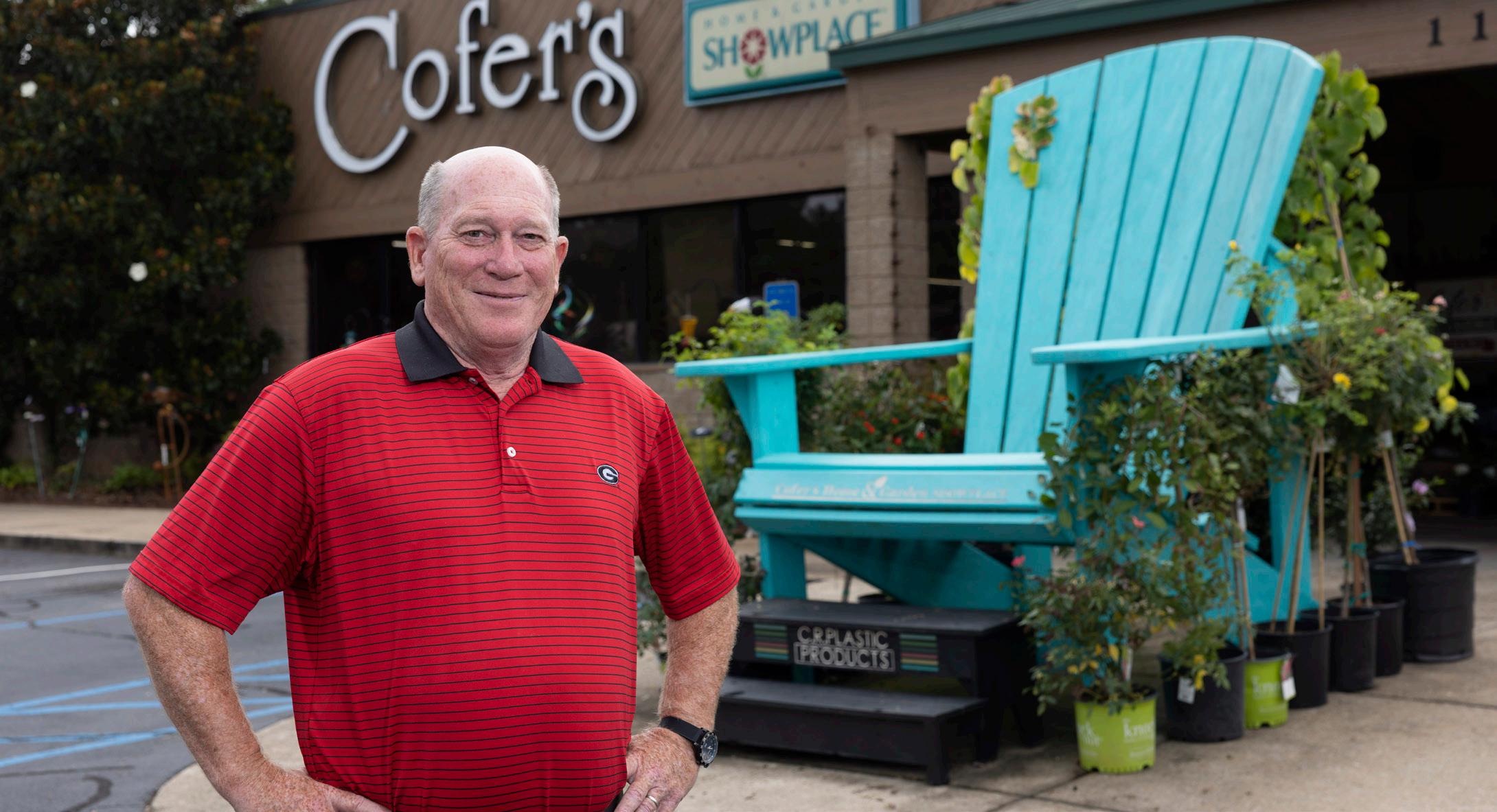
Cofer, an Athens native who graduated from UGA with a degree in small business management, followed in his family’s foot steps, which is a popular thing to do in the Cofer household. Cofer, his father, and his brother all graduated from UGA—with his son closing the circle as a senior in the Terry College of Business.
Beyond sharing the Georgia genes, the Cofer family is widely known locally for their plant nursery, Cofer’s Home & Garden, founded in 1922 by Stuart’s grandfather as a seed and feed supply store in downtown Athens. The flagship store is now on Mitch ell Bridge Road on the city’s west side. They sell unique plants, shrubbery, and outdoor furniture. The focus is on yards and gardens rather than catering to what was then an ag ricultural economy.
“From a young age, my brother and I had
an interest in coming to the family business. That’s where our hearts always were,” Cofer says.
Although he spent a few years after college in Los Angeles, working his way up the chain at Enterprise Rent-A-Car, Cofer always knew he’d return to Athens.
This year marks the family’s 100th in busi ness. “It’s surreal,” says Cofer, president and self-proclaimed inventory control manager. “It’s quite a milestone.”
By some estimates, only 13% of fami ly-owned businesses make it to the third generation, with the exceedingly rare 4% surviving to the fourth. Cofer’s Home & Garden, currently sitting at the third-gen eration level, will be that exception: Cofer’s son, Stephen, will begin easing into the job in the years that follow his UGA graduation.
As the Cofer family business has been around for a century, it’s not surprising that they have a bit of Athens’ history in their roots. The warehouse on Spring Street, where Cofer spent his childhood running around with his brother and cousins, is now UGA’s Delta Innovation Hub.
“It’s neat to know that this warehouse is now a hub for entrepreneurs and startups,” Cofer says. “That’s what my grandfather was, and here we are 100 years later and that building is still being used for entre preneurs.”
Cofer credits a few key things to the busi ness’s success: responding to the needs of the local economy, for instance. “If my grandfa ther was to walk in the store today, he would have no clue that this was the business he started in 1922,” he jokes.
Although he never pressured his kids into joining the business, Cofer enjoys bringing his 7-year-old granddaughter to the store and showing her the importance of hard work.
“There’s a lot of stress involved in owning your own business, but you take great pride in what you’re able to create, what you’re able to grow, and how you position yourself and your business in the community,” he says. “People recognize you for that. There’s a lot of pride in being able to accomplish those things.”
georgia magazine | fall 2022 51 CLASS NOTES peter frey
written
MA ’19
by alexandra shimalla
ALUMNI PROFILE
Stuart Cofer BBA
’81
CLASS NOTES
and is a program manager at Google in Atlanta.
David Sever BBA ’21, BBA ’21 is a supply chain consultant for Protiviti in Charlotte, NC.
Eva Bauer BBA ’22, BBA ’22 is a financial management analyst in the CFO group at Bank of America in Charlotte, NC.
Anna Bowen BBA ’22, BBA ’22 is an underwriter for Utica Nation al Insurance Group in Atlanta.
Carley Cronic AB ’22 is a product marketing analyst with NCR in Atlanta.
Brooke Fitzgerald BS ’22 will be returning to UGA for gradu ate school to earn an accelerat ed master’s in applied behavior al analysis.
Austin Grant AB ’22 is a project manager for Epic, a health care software company.
Ben Grisham BBA ’22 is a sum mer intern with Ernst & Young and plans to return to UGA in the fall to pursue a master’s of accounting degree.
Khurtasha Hutchinson
Elizabeth Milano AB ’18 is a dig ital video producer with Access Hollywood in New York City.

Josh Clifford AB ’19, AB ’19, BS ’19 is a product writer for the Esri Field Apps team and started the Esri podcast Field Notes with a coworker in June 2021.
Honor Garrett BSFCS ’19 has been promoted to account executive at McNeely Brockman Public Relations, a Nashville-based
communications and PR agency.
Avalon Kandrac BSBE ’19 is an assistant project manager with Choate Construction in Nashville, TN.
Natashya Santosa BBA ’19 is a global equity, compensation, and mobility business process consul tant at The Coca-Cola Company.
Katie Kim AB ’20 is a part of TEGNA’s Producer-in-Residence program and is currently serving
as a race and culture producer at KXTV in Sacramento.
Caroline Worthy BSCE ’20 is a civil engineer in the ports and marine sector with AECOM in Savannah.
2021-2022
Taylor Bell BBA ’21 is a financial services representative at Cap stone Financial in Atlanta.
Godswill Nwankwo BBA ’21 owns Mygrate, a blockchain startup,
BSW ’22 will return to UGA in the fall as part of the Master’s of Social Work Advanced Stand ing program on the combined specialization track. She will also pursue her certificate in nonprofit management and leadership.
Miller Lantis BS ’22, BSFCS ’22 will be attending Michigan State University College of Osteopathic Medicine.
Rebecca Merriken AB ’22, AB ’22 is returning to UGA in the fall to earn her master’s in public administration.
Brooke Rogers AB ’22, AB ’22 teaches dance for Atlanta Dance Central and Creative Movement
52 georgia magazine | fall 2022
Field of Dreams
He was encouraged to join the paper by Carrie Gibson ABJ ’98 (a critically acclaimed author). And his first sports editor was Mark Schlabach ABJ ’96, who wrote college sports at The Atlanta Journal-Constitution before be coming one of ESPN’s most well-known NCAA reporters.
Rosecrans’ work was noticed off campus. During his senior year, the Athens Ban ner-Herald hired him part-time, and he stayed on full time after graduation until 2003.
Rosecrans joined the staff of the Cincinnati Post in 2004. In 2007, he finally got the base ball beat he coveted. After the Post folded, he bounced around the Cincinnati media land scape a few years before he took over the Reds beat for the Cincinnati Enquirer in 2013. He kept the beat when he moved to The Athletic
Rosecrans’ role with the Post started his clock for the BBWAA, which requires 10 years of experience for membership. With his 2014 acceptance came the honor—and responsibil ity—of filling out a Hall of Fame ballot.

That’s when he got the notebook.
The Moleskine notebook C. Trent Rose crans keeps on the bookshelf of his home office in Cincinnati has a lot of mileage. It’s within arm’s reach of his com puter at all times.
The notes, numbers, and observations he scribbles in it date back to 2015, the first year he voted for the National Baseball Hall of Fame.
That was a big year.
Randy Johnson and Pedro Martinez were elected in their first year of eligibility—and the statistical case for their election is right there in those well-worn pages.

Rosecrans ABJ ’98 has nearly 25 years of experience as a sports journalist, and he has covered the Cincinnati Reds since 2007 for a variety of publications, including The Athletic, the online sports site he joined in January 2018.
In 2021, he reached a pinnacle of his pro fession, serving as president of the Baseball Writers Association of America (BBWAA),
the 700-plus member body that votes for the Hall of Fame every year. As past-president, he remains on its board this year.
With a 162-game regular season, plus Spring Training and post-season games, the baseball beat is generally viewed as sports writing’s most strenuous gig, and Rosecrans is not alone in relishing the challenge.
“You can always tell aviators by the way they walk,” says Rosecrans, who grew up on military bases around the world. His father was a nurse in the U.S. Navy. Rosecrans says the same is true for how baseball writers talk, developing a lingo that sets them apart from—and in their opinion above—other sportswriters.
“We are so egoistical that we call ourselves ‘ball writers,’ as if none of the other sports have balls,” he says.
As a UGA journalism student, Rosecrans joined the staff of The Red and Black, which was putting together a veritable mid-90s AllStar team of its own.
In addition to keeping copious notes on Hall-eligible players, when voting time rolls around, Rosecrans talks to players, execu tives, managers, scouts, and other writers discussing the merits of each player. These types of conversations are not new.
“I remember having those debates with my dad as a kid. At the time, he was the expert. Mickey Mantle was his favorite player. Then I was the expert. He passed away in February,” Rosecrans says, pausing slightly.
“Even when he was having trouble talking, we still talked about my Hall of Fame ballot. He’d always ask, ‘Why? Why did you vote for this guy and not that guy?’ It was never a judg ment. It was really just a question to see how someone else is thinking.”
That perspective about transparency is why Rosecrans releases his Hall of Fame ballot for public view. (It’s not required.) While other writers refuse to discuss their choices, Rosecrans freely discusses his on podcasts, in columns for The Athletic, and in other forums.
georgia magazine | fall 2022 53 CLASS NOTES
written by eric rangus MA ’94
C. Trent Rosecrans ABJ ’98
PROFILE
emilee chinn/cincinnati reds
ALUMNI
michaelanderson/cincinnati reds
CLASS NOTES
and Dance in Atlanta.
Quinn Shelt AB ’22 is Miss Augusta and promotes Alzheimer’s disease support and research.
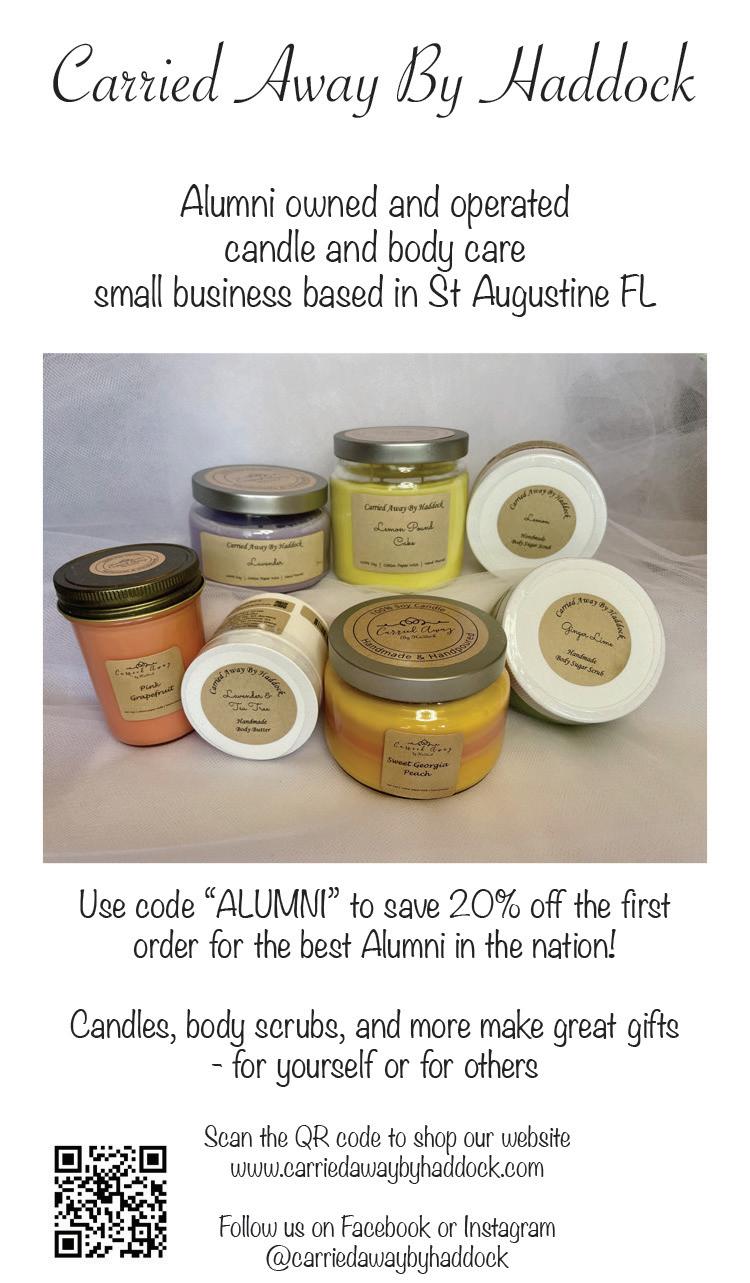
Carolyn Fore MEd ’74 published a collec tion of memoirs, The Place Light Gets In, in collaboration with eight other authors in February 2022.
Janice Hogle PhD ’99 has partnered with her brother to create a business called Dad’s Ashes, an alternative to the tradi tional burial of loved ones.
grad notes
agricultural & environmental sciences

Bek Amatov MS ’15 is a vice president of wholesale risk advanced analytics at Bank of America in Charlotte.
arts & sciences
Joseph Hester PhD ’73 serves on the editorial board for the Journal of ValuesBased Leadership, the international jour nal published by Valparaiso University’s College of Business. He also published “A Leadership Role: Creating an Ethics of Diversity” in the journal in January.
Juanita Karpf MM ’86, DMA ’92 published her book Performing Racial Uplift: E. Azalia Hackley and African American Activism in the Post-Bellum to Pre-Harlem Era, in January.
business
Tiffane Davis MBA ’07 and her husband launched a men’s accessories boutique, A Polished Man, in Greenville, SC. Jessica Vash MBA ’21 is an associate broker at KW Commercial in Atlanta.
education
Nancy Hensel EdD ’73 published her book Undergraduate Research at Community Colleges: Equity, Discovery, and Innovation in October 2021. She is also the co-ed itor of Undergraduate Research in Online, Virtual, and Hybrid Courses: Proactive Practices for Distant Students, published in February.
Carol McNulty PhD ’01 was appointed the associate provost for undergradu ate education and faculty affairs at the University of North Carolina Wilmington in April. She has served as interim for the role since July 2021.
Lora Smothers MEd ’11 is the founder and director of the Joy Village School in Athens.
Ansley Howze MBT ’22 was promoted to executive director of the American Heart Association in the CSRA and Southern Coast in October.
environment & design
Russell Oliver MEPD ’15 received the 2022 Community Collections Grant from the Library of Congress. Beginning in March, he will work to complete research documenting the stories, agricultural traditions and culture of spe cialty coffee farmers in Puerto Rico, and his work will be included in the library’s various permanent collections.
forestry & natural resources
Pooja Gupta PhD ’20 started her position as a bioinformatician at the Utah State Public Health Laboratory in Salt Lake City in August 2021.
journalism & mass communication
Rachel Balducci MA ’97 published her book No Such Thing as Ordinary in May.
Stephenie Magister MA ’13 is an editor for USA Today best-selling and award-winning books. She owns the website Stephenie Edits and runs the Medium columns “Dear Cisters and Transgender Soapbox.”
54 georgia magazine | fall 2022
pharmacy
Danielle Donaldson PharmD ’14 is the coowner of Chemist Spirits in Asheville, NC. The distillery was selected as the official gin of the 2022 Daytime Emmy Awards in June.
social work
Ron Scroggy MSW ’85 serves on the board of the Edisto Island Preservation Alliance and is a volunteer with the Edisto Island Loggerhead Turtle Patrol.
law
Tedra Cannella JD ’07, Rob Snyder AB ’99, JD ’08, and Rory Weeks AB ’08, MA ’12, JD ’13 are partners in the law firm Canella Snyder in Decatur. Shalanna Pirtle JD ’07 is the chief talent, diversity, and inclusion officer and a partner at the law firm Parker PoeAdams & Bernstein.
keep up with the bulldog nation
advertise in Georgia Magazine
Published quarterly and mailed to the household, your advertising message reaches your audience directly, giving you one of the strongest demographic buys in the region. For information on advertising in the award-winning Georgia Magazine, contact gmsales@uga.edu or 706-542-9877.
Quickest way to send Class Notes
E: gmeditor@uga.edu
W: ugamagazine.uga.edu
send us your notes
Help UGA and your classmates keep up with what’s happening in your life— both personally and professionally—by sending Class Notes items to one of the addresses listed below. And please include your current address to help us keep our alumni database up to date. If you send a photo, please make sure it is a resolution of 300 dpi.
Class Notes is the first section we work on, so keep these deadlines in mind: for the Spring (March) issue, submit by December 1; for Summer (June), submit by March 1; for Fall (September), submit by June 1; for Winter (December), submit by September 1.
Or send a letter to: Georgia Magazine 286 Oconee Street Suite 200 North University of Georgia Athens, GA 30602-1999

UGA Alumni Association
Please submit online at alumni.uga.edu/classnote
georgia magazine | fall 2022 55 CLASS NOTES
@universityofga
Martin Kagel
Associate Provost for Global Engagement Office of Global Engagement
 A.G. Steer Professor in Goethe Studies Franklin College of Arts & Sciences
A.G. Steer Professor in Goethe Studies Franklin College of Arts & Sciences
Anative of Germany, Kagel has spent decades teaching German studies and helping others understand the importance of the humanities and international studies. During his tenure at UGA, Kagel has served as the head of the Department of Germanic and Slavic Studies, as associate dean for humanities and international studies in the Franklin College and now oversees UGA’s Office of Global Engagement.
Kagel’s research has addressed subjects in German literature and culture from the 18th to the 21st century. He is especially interested in German-Jewish and European studies, as well as in uncovering the mechanics of the literary marketplace. Kagel has co-developed several programs at UGA, including student and faculty exchange programs between UGA and Ludwig Maximilian University of Munich, a minor in transnational European studies, and a dualdegree program in German and engineering that includes a year of study abroad.
What first piqued your interest in German studies?
When I began my studies in Berlin, I was an eager student, hungry for more knowledge about my own country’s history and literature.
I wanted to dig deeper, better understand German cultural attitudes and political developments, and studying German literature offered a path to do so, a very enjoyable one at that. Later, when I studied in the U.S. at the University of WisconsinMadison, where I got my Ph.D., I learned to appreciate the American perspective on Germany, a unique outside perspective that opened up new and compelling questions.
Why are humanities courses valuable for students?
Because we are human. There is so much you can learn from study in the humanities. You learn about people’s motivations, how societies function, how to describe your feelings and those of others, about ethical quandaries one can face, and what gives meaning to our lives. And, of course, foreign language and intercultural studies are part of the humanities. No education is complete without extensive study in the humanities.
You currently serve as associate provost for global engagement. How important are students’ international experiences?
In an ideal world, every student at UGA would have the opportunity to study abroad. Why? Because the experience of being in a culture that’s not your own teaches you invaluable lessons about cultural difference, about the diversity of peoples, about economic and educational disparities, how others see us, as Americans, and about how our actions here impact people’s lives in other parts of the world. We want our students to be global citizens. Study abroad plays an essential role in this endeavor.
56 georgia magazine | fall 2022
peter frey
FACULTY FOCUS
Endowed chairs—positions that receive supplemental support generated from private donations—are essential to recruiting and retaining leading faculty who are committed to world-changing research and preparing the next generation of problem-solvers, pioneers, and leaders. Learn more about supporting UGA’s leading faculty at GIVE.UGA.EDU

286 Oconee Street, Suite 200 North
University of Georgia, Athens, GA 30602

Non-Profit Org. US Postage PAID University of Georgia
Change Service Requested





























































































 Leo Chris Kasuya
Kenneth L. Johnson, Jr.
Michael Waldron
Brendan F. Murphy
Rachel Santos
Mia Catharine Mattioli
Kevin Schatell
Joel L. McKie
ValaRae Partee
Samaad Wes Keys
Alton M. Standifer
Juan J. Mencias
Anna Daniel Reddish
Charlotte Lucas
Johnelle Simpson II
Drew McKown
Andrew Rasmussen
Min Y. Lee
Grant Thomas
Chad Mumm
John Rossow
Brandon Martin
Christie Johnson
Kristen Henderson
Shayla Hill
Leo Chris Kasuya
Kenneth L. Johnson, Jr.
Michael Waldron
Brendan F. Murphy
Rachel Santos
Mia Catharine Mattioli
Kevin Schatell
Joel L. McKie
ValaRae Partee
Samaad Wes Keys
Alton M. Standifer
Juan J. Mencias
Anna Daniel Reddish
Charlotte Lucas
Johnelle Simpson II
Drew McKown
Andrew Rasmussen
Min Y. Lee
Grant Thomas
Chad Mumm
John Rossow
Brandon Martin
Christie Johnson
Kristen Henderson
Shayla Hill
















 Tom Bliss, director of UGA's Shellfish Research Laboratory on Skidaway Island, wades through knee-deep muck at Romerly Marsh Creek. The oar he's carrying will be used as a temporary surface to walk on while tossing bags of oysters along the shore.
Tom Bliss, director of UGA's Shellfish Research Laboratory on Skidaway Island, wades through knee-deep muck at Romerly Marsh Creek. The oar he's carrying will be used as a temporary surface to walk on while tossing bags of oysters along the shore.
















 nicholas kreitz
nicholas kreitz


























































 A.G. Steer Professor in Goethe Studies Franklin College of Arts & Sciences
A.G. Steer Professor in Goethe Studies Franklin College of Arts & Sciences



